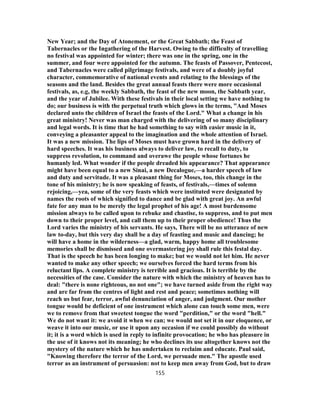The document examines the appointed feasts and holy days as outlined in Leviticus 23, detailing the significance and observance of these occasions in the worship of God by the Israelites. It emphasizes the importance of the Sabbath and other festivals, describing their historical origins and the commandments associated with their observance. The commentary reflects on the communal aspects of these celebrations and their enduring relevance in Jewish tradition.
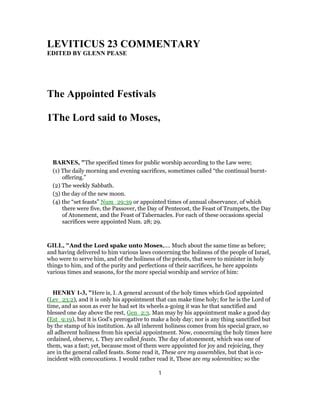
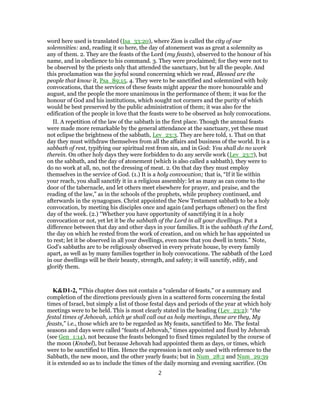
![the “holy convocation” see Exo_12:16.)
COFFMAN, "Verse 1
PART FOUR
ON HOLY DAYS AND SEASONS
(Leviticus 23-25)
Here begins the fourth major division of Leviticus dealing principally with the
various holy days and festivals observed by the children of Israel. This division
comprises Leviticus 23-25, with Leviticus 24 being somewhat of a parenthesis.
Significantly, these great festivals outlined here are still observed by the Jews all
over the world, although with changes that have inevitably occurred. There was
only one fast day, the Day of Atonement. In post-exilic times, the Jews imposed
many fasts upon their people, but without God's command or sanction. It was a
boast of the Pharisee (Luke 18) that he "fasted twice in the week"!
This part of Leviticus is distinguished by the continued use of "I am the Lord your
God," frequently used to terminate paragraphs. Here it divides this chapter into two
parts detailing the spring festivals (Leviticus 23:22), and the autumn festivals
(Leviticus 23:43). The major divisions of the chapter ending in those verses are
further subdivided by the clause, "this is a permanent rule for your descendants
wherever you dwell" (Leviticus 23:14,21,31,41).
The principal thrust of the chapter regards the people's observance of these
festivals. The detailed types of sacrifices required, which concerned chiefly the
priests, are presented later in Numbers (Numbers 28-29).
Some of these festivals occurred at times of the year when many festivals in the
pagan world had been observed continually for ages, and, as we should have
expected, critical enemies of the Bible try to find the origin of these O.T. festivals in
the older pagan ceremonies occurring about the same time, but all such attempts
have failed. "The original ground of these festivals was not the natural celebrations
of pagans, but historical. All of these observances derived from circumstances
attending the birth of the nation of Israel and their deliverance from Egyptian
bondage."[1] The divine origin of these celebrations is seen, for example, in the very
name Passover, which memorializes the passing over of the houses of Israel the
night when an angel of God slew the firstborn in all Egypt. Also, the Feast of
Unleavened Bread, during which no leaven was used for a whole week, still speaks,
as it did at the inception of the celebration, of the haste in which the children of
Israel were brought out of the land of their bondage, there being no time for leaven
3](https://image.slidesharecdn.com/leviticus23commentary-161220145537/85/Leviticus-23-commentary-3-320.jpg)
![to be allowed to rise! The finger of God was in all of those ancient festivals, and it is
still visible for those who will observe it. Thus, "The naturalistic identification of
these feasts with the harvest feasts of other nations is a mistake."[2]
"And Jehovah spake unto Moses, saying, Speak unto the children of Israel, and say
unto them, The set feasts of Jehovah, which ye shall proclaim to be holy
convocations, even these are my set feasts. Six days shall work be done: but on the
seventh day is a sabbath of solemn rest, a holy convocation; ye shall do no manner
of work: it is a sabbath unto Jehovah in all your dwellings."
"Holy convocations ..." These words "do not signify the necessity of a journey to the
sanctuary. Appearance at the tabernacle to hold the holy convocations was not
regarded as necessary either in the law itself or in later orthodox custom."[3] As a
matter of fact, and of history, religious meetings for the purpose of conducting
worship were held every sabbath day WHEREVER Jews lived; and, "It was out of
these that the synagogues arose."[4]
The sabbath itself is here mentioned somewhat parenthetically, because the sabbath
itself was NOT one of the great festivals about to be proclaimed. However, it was a
most vital part of the Jewish religion and is appropriately named here at the outset.
Besides, the observance of additional sabbaths was involved in festivals themselves.
"Ye shall do no manner of work ..." (Leviticus 23:3). This is a more restrictive
commandment than the one found in Leviticus 23:7,8,21,25,35,36, where "ye shall
do no servile work," is the prohibition. "There is a definite indication here that the
regular, frequently occurring sabbath was intended to be a holier day than any of
the set feasts."[5] Similarly, in Christianity, the extreme sanctity of the regular,
frequently-occurring Lord's Day services, constitute the holiest occasions of all.
What a shame it is that the historical church has tended to downgrade the weekly
observance and give the great stress to "special occasions," not commanded by the
Lord at all, but devised by men, such as Easter, Christmas, Whitsunday, Good
Friday, etc.
BENSON, "Leviticus 23:41. Ye shall keep it a feast unto the Lord seven days in the
year— These days were spent in great festivity and joy; the highest part of which
consisted in the drawing and pouring out of water: the Talmudists say of this, that
he who never saw the rejoicing of drawing of water, knows not what rejoicing is.
This custom is thought to have been in memory of the miraculous water which
flowed from the rock in the wilderness; and undoubtedly was figurative of the
gospel-grace; see Zechariah 14:16. The words of Isaiah 12:3 were sung during this
ceremony; With joy shall ye draw water out of the wells of salvation: to which it is
believed our Saviour alluded, when he cried out in the temple, on the last day of this
solemnity; If any man thirst, let him come unto me and drink: he that believeth on
me, as the Scripture hath said, out of his belly shall flow rivers of living water, John
7:37-38. It is probable, that the Pagans derived their festivals in honour of Bacchus
from this feast of the Jews.
4](https://image.slidesharecdn.com/leviticus23commentary-161220145537/85/Leviticus-23-commentary-4-320.jpg)
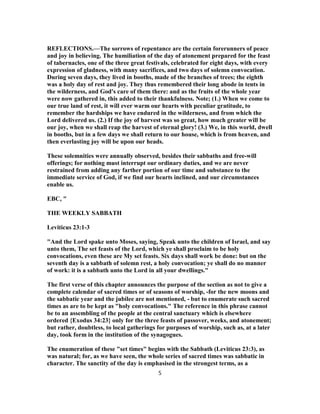




![EXPOSITION
THIS Part consists of Leviticus 23:1-44, and Leviticus 25:1-55, with Leviticus
24:1-23 parenthetically introduced.
Every religion must have its round of holy days and seasons:
1. To give occasion for manifesting joyous thankfulness to the Giver of all good
things.
2. To keep alive the memory of past events around which religious associations
cling.
3. To impress upon the hearts of the worshippers those sacred mysteries which are
regarded as essential characteristics of the system.
1. The duty and happiness of rejoicing before the Lord find a prominent place
under the Mosaic dispensation, as they must in any religion where man feels himself
in a covenant relation with God, brought nigh to him by himself, and no longer
estranged from him who is his only true life and happiness. Accordingly, the first
thought of the annual Jewish festivals is that of joyous thankfulness, such as is
becoming to reconciled children grateful to their Father for the many bounties that
they receive at his hands. The first gift of God of which man becomes conscious is
that of the daily sustenance provided for him, and therefore we should expect holy
days to be appointed to commemorate the goodness of God in bestowing the gifts of
the earth. The first aspect, therefore, in which to regard the three great annual
festivals—the Passover, Pentecost, and the Feast of Tabernacles—is that they were
days of thanksgiving for the fruits of the earth dispensed by God to man.
First, with regard to the Passover. We read at Leviticus 24:10, Leviticus 24:11,
"When ye be come into the land which I give unto you, and shall reap the harvest
thereof, then ye shall bring a sheaf [or an omer] of the firstfruits of your harvest
unto the priest: and he shall wave the sheaf before the Lord, to be accepted for you:
on the morrow after the sabbath the priest shall wave it." The words, "the morrow
after the sabbath," mean, as we shall see, the day after the first day of Unleavened
Bread, that is, the second day of the feast, Nisan 16, which fell early in April, when
the first barley was ripening in Palestine. On the 14th day of Nisan (the day of the
Paschal sacrifice) a certain quantity of standing barley was marked off, by men
specially appointed for the purpose, in a field ploughed the previous autumn and
sown at least ten weeks before the Passover, but not prepared artificially in such a
way as to hasten the crop. On the following day, Nisan 15, at sunset, three men were
sent to the selected field, and, in the presence of witnesses, cut the ears of corn
before marked, and brought them into the temple. On the next day, Nisan 16, this
corn, whether in the form of a sheaf or of flour, was offered to the Lord by being
waved before him, and then consigned to the priest. Here, by the presentation of the
10](https://image.slidesharecdn.com/leviticus23commentary-161220145537/85/Leviticus-23-commentary-10-320.jpg)

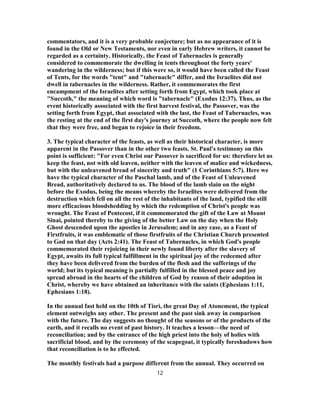
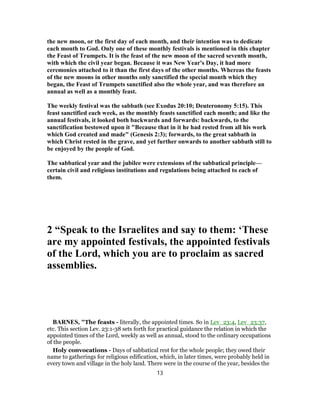

![piety.
COKE, "Leviticus 23:2. Concerning the feasts of the Lord, &c.— These words
might be rendered more unexceptionably thus: the solemnities of the Lord, which ye
shall proclaim, with holy proclamations, are these my solemnities: i.e. stripped of
the Hebrew idiom, these are the holy solemnities of the Lord, to be publicly
proclaimed and observed. They were to be proclaimed by the sound of a trumpet.
See Numbers 10:8. Solemnities is a more unexceptionable word than feasts, as the
day of atonement could not properly be styled a feast. The original word signifies
any appointed or regular assembly or congregation, and is very expressive of these
solemn meetings of the Jews. "The word used here," says Dr. Beaumont, "is the
same as in Genesis 1:14. מועד moed; and generally signifies a set time or season; but
is applied here to the solemn feasts which were appointed by God at their set-times
in the year."
ELLICOTT, " (2) Speak unto the children of Israel.—As the festivals here discussed
were to be solemnly kept by them, Moses is ordered to address these regulations to
the people or their representatives.
Concerning the feasts of the Lord . . . Better, the festivals of the Lord which ye shall
proclaim as holy convocations, these are my festivals. That is, the following festivals
God claims as His, on which solemn assemblies are to be held in the sanctuary.
PETT, "Leviticus 23:2
“Speak to the children of Israel, and say to them, The set feasts of Yahweh, which
you shall proclaim to be holy convocations, even these are my set feasts.”
Moses is to declare to the children of Israel what are His set feasts. He is to proclaim
them as ‘holy convocations’, holy ‘calling-togethers’. They are the times when His
people must come together for the purposes of joint worship and renewal of the
covenant which bound them all together as His people.
There were, of course, already recognised times of celebration among many nations
and tribes. They covered the lamb harvest, the barley harvest, the wheat harvest
and the harvest of summer fruits and vintage. But in Israel’s case they also included
celebration of the deliverance from Egypt at the Passover, and a recognition of the
nation’s failures at the Day of Atonement, and a reminder of when they had dwelt in
tents in the wilderness. Thus they were to celebrate both Yahweh’s continual
provision in the various harvests and Yahweh’s deliverance, both past and present,
deliverance from Egypt in the past (Passover), and deliverance from sin in the
present (Atonement).
TRAPP, "Leviticus 23:2 Speak unto the children of Israel, and say unto them,
[Concerning] the feasts of the LORD, which ye shall proclaim [to be] holy
15](https://image.slidesharecdn.com/leviticus23commentary-161220145537/85/Leviticus-23-commentary-15-320.jpg)
![convocations, [even] these [are] my feasts.
Ver. 2. To be holy convocations.] Not bare rests, as Plato said, that the gods, pitying
men’s labour, appointed their festivals to be a remission of their labour. (a) {See
Trapp on "Exodus 20:8"} {See Trapp on "Exodus 20:9"} {See Trapp on "Exodus
20:10"} {See Trapp on "Exodus 20:11"}
PULPIT, "Leviticus 23:2
Concerning the feasts of the Lord, which ye shall proclaim to be holy convocations,
even these are my feasts. The translation should rather be, The appointed times
which ye shall proclaim to be holy convocations, these are my appointed times. The
appointed times (mo'adin) include the great fast as well as the festivals, and the
weekly and monthly as well as the annual holy days. The primary purpose with
which the following enumeration of holy days is introduced, is to give a list of the
holy convocations. While the Israelites were still dwelling in the wilderness, a holy
convocation appears to have been a religious assembly of all the males in the court
of the tabernacle. After the settlement in Canaan, a religious gathering for prayer or
festive rejoicing in all their dwellings, that is, wherever they lived, would have
satisfied the command to hold a holy convocation, except on the three great festivals,
when all who could, "kept the feast" at Jerusalem. There were in all seven holy
convocations in the year, besides the sabbath, namely, the first and last days of
Unleavened Bread, the Feast of Pentecost, the Day of Atonement, the Feast of
Trumpets, the first and last days of the Feast of Tabernacles.
BI 2-44, "These are My feasts.
The holy festivals
I. Commentators generally on this part of Hebrew law have remarked upon the social,
political, and commercial benefits resulting to the Jewish people from these national
festivals and convocations. They served to unite the nation, cemented them together as
one people, and prevented the tendency to the formation of separate cliques and
conflicting clans or states. These convocations also had great effect upon the internal
commerce of the Hebrew people. They furnished facilities for mutual exchanges, and
opened the ways of trade and business between the various sections.
II. There was also A direct religious value and forethought in the appointment of these
festivals. They prescribed public consociation in worship. Man is a worshipping being. It
is not only his duty, but his nature and native instinct to worship. Mere isolated worship,
without association in common set services, soon dwindles, flags, degenerates, and
corrupts. Neither does it ever reach that majesty and intense inspiration which comes
from open congregation in the same great acts of devotion. “As iron sharpeneth iron, so
man sharpeneth the countenance of his friend.” And just as the multitude of these
mutual sharpeners is increased, will their common devotion be deepened and
augmented.
III. I propose to speak more particularly of the typical relations of these holy feasts and
seasons. We have in them a system of types, chronologically arranged, to set forth the
16](https://image.slidesharecdn.com/leviticus23commentary-161220145537/85/Leviticus-23-commentary-16-320.jpg)






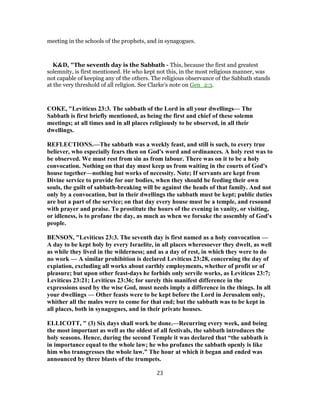
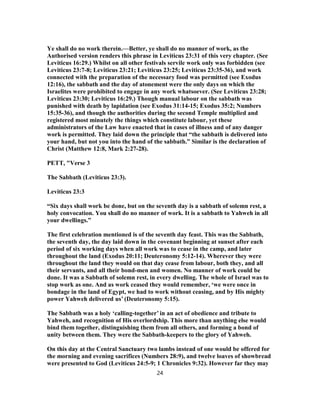
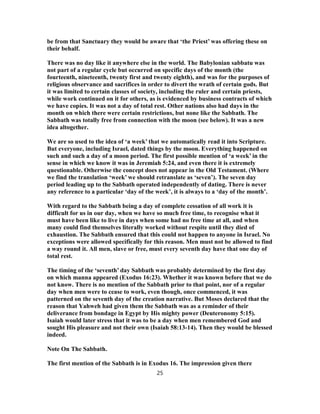
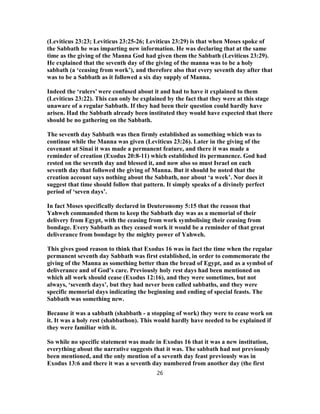
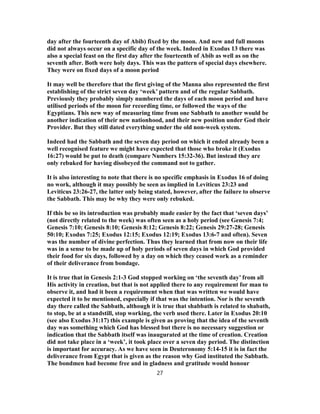
![Yahweh by dedicating a work-free day to Him.
Thus we should note that ‘the seventh day’ was not something that was fixed as the
last day in a week. The week did not come first. The idea of the seventh day of a
series of days came first. The reason that it was special was precisely because it was
the seventh day of a divinely complete series. It was because God introduced the
idea of a Sabbath every seventh day in Exodus 16 to follow each six day series of
giving of the Manna that the week eventually resulted. This brings out how
important the Manna was seen to be, that the giving of it led up after each six day
period to a Sabbath. God was sealing the fact that it was a divine supply. But for
calendar purposes they still thought of moon periods.
End of Note.
So the Sabbath was to be seen as primary. It would distinguish Yahweh’s people
from all others, and ensured that on one day in seven they turned from the demands
and trials of daily life to a day of contemplation and worship. Every seven days they
would observe a feast. It was to be Yahweh’s day, a day of ceasing work and a day
of remembering. It reminded them of creation, and of the Creator (Exodus 20:11). It
reminded them that their lives continually followed His creation pattern. It
reminded them that they had been delivered from bondage in the land of Egypt,
that they had not been able to cease work then, and that Yahweh had mightily
delivered them. Indeed the latter is why He commanded them to keep the Sabbath
day (Deuteronomy 5:15).
TRAPP, "Leviticus 23:3 Six days shall work be done: but the seventh day [is] the
sabbath of rest, an holy convocation; ye shall do no work [therein]: it [is] the
sabbath of the LORD in all your dwellings.
Ver. 3. Ye shall do no work therein.] Save only works of piety, charity, and
necessity. These are allowed by our Saviour. [Mark 2:23-28; Mark 3:4] The Jews
superstitiously hold, (a) that it is not lawful for a blind man to lean upon a staff on a
Sabbath day, as the lame may: that if a flea bite a man on that day, he may take it,
but not kill it. That if a thorn prick him in the foot on that day, he may not pull it
out. That a tailor may not carry a needle, much less a sword; that a man may not
spet, (b) or be taken out of a jakes, as that Jew of Tewkesbury, who said,
“ Sabbata santa colo, de stercore {c} surgere nolo. ”
Whereunto the Earl of Gloucester replied,
“"Sabbata nostra quidem (Solomon) celebrabis ibidem." ”
“(Sir, reverence (d) of the Sabbath keeps me here:
And you, sir, reverence (e) shall our Sabbath there.)”
28](https://image.slidesharecdn.com/leviticus23commentary-161220145537/85/Leviticus-23-commentary-28-320.jpg)
![In all your dwellings.] Where you are to sanctify this rest, and to repair to your
synagogues. [Acts 15:21]
PULPIT, "The seventh day is the sabbath of rest. This is a very strong expression,
literally, the sabbath of sabbatism, which doubles the force of the single word. Ye
shall do no work therein. The sabbath and the Day of Atonement were the only days
in which no work might be done, whereas on the other festivals it was only no
servile work that might be done. It is not to be observed solely where the tabernacle
is pitched or the temple is built, but in every town and village of Canaan—in all
your dwellings. In the sanctuary itself the peculiar characteristics of the sabbath
were a holy convocation, the renewal of the shewbread, and the burnt offering of
two lambs with their meat and drink offerings (Numbers 28:9, Numbers 28:10);
elsewhere it was observed only by the holy convocation and rest from all labour. It
commenced at sunset on Friday evening, and continued till sunset on Saturday
evening. In later days the hour at which it began was announced by three blasts of
the priests' trumpets, immediately after which a new course of priests entered on
their ministry.
The Passover and the Festival of Unleavened
Bread
4 “‘These are the Lord’s appointed festivals, the
sacred assemblies you are to proclaim at their
appointed times:
BARNES, "The recurrence of the sabbatical number in the five annual days of holy
convocation should be noticed.
GILL, "These are the feasts of the Lord, even holy convocations,.... What
follow besides the sabbath mentioned:
which ye shall proclaim in their seasons; the proper times of the year, the day or
days, and month in which they are to be observed; these were to be proclaimed by the
29](https://image.slidesharecdn.com/leviticus23commentary-161220145537/85/Leviticus-23-commentary-29-320.jpg)
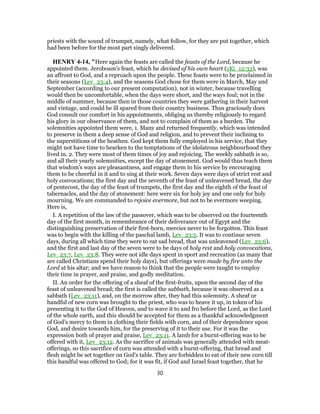

![Commandment had no other object or use except to exercise the people in the
service of God; but since the killing of the lamb represented the grace of adoption
whereby God had bound them to Himself, it was necessary to annex it to the First
Commandment. Let my readers therefore now be content with the other part, i.e.,
that its annual celebration was a help to the perpetual recollection by the Israelites
of their redemption.
COFFMAN, "Verse 4
"These are the set feasts of Jehovah, even holy convocations, which ye shall
proclaim in their appointed season. In the first month, on the fourteenth day of the
month at even, is Jehovah's Passover. And on the fifteenth day of the same month is
the feast of unleavened bread unto Jehovah: seven days ye shall eat unleavened
bread. In the first day ye shall have a holy convocation: ye shall do no servile work.
But ye shall offer an offering made by fire unto Jehovah seven days: in the seventh
day is a holy convocation; ye shall do no servile work."
Sometimes one encounters the proposition that "six feasts are mentioned in this
chapter, whereas there are only three in Exodus 34," with the usual reference to
"later editors," "redactors," etc., but, as Kellogg pointed out, the three major feasts
here: Unleavened Bread, Pentecost, and Tabernacles are carefully distinguished and
set apart from the others by "the use of the Hebrew word [~haggiym], a word that
sets them apart and signifies a special degree of gladness and festivity."[6] The
purpose in Exodus was to name only the [~haggiym]; whereas, here, "the appointed
seasons" are named (distinguished by the Hebrew word [~haggam]). Since the
[~haggam] included also the [~haggiym] given in Exodus 34, they were of necessity
included here also.[7]
PASSOVER. This was the great celebration of the night of God's deliverance from
Egyptian bondage, an event that followed immediately after the tenth and final
visitation of God's wrath upon Egypt in the slaying of the firstborn. It was
celebrated on the fourteenth of Nisan (the old name was Abib), the first month of
the ecclesiastical year.
FEAST OF UNLEAVENED BREAD. This followed at once upon the celebration of
Passover; it lasted seven days; and both the first day (the fifteenth) and the last day
(the twenty-first) were also observed as holy convocations (sabbaths, or periods of
rest). In this appears the back-to-back sabbaths on the successive dates of Nisan
14,15 which also occurred while our Lord was in the tomb. That is why Matthew
wrote, "And after the sabbaths (plural) were past ... came Mary Magdalene ... etc."
(Matthew 28:1, see the Greek Text). The recognition of this truth has a significant
bearing upon determining what day it was when our Lord was crucified.
"Ye shall do no servile work ..." (Leviticus 23:7). We have already noted that this
was a less strict command than the "no manner of work" prohibited on the sabbath.
Orlinsky gave the meaning of this phrase as, "You shall not work at your
32](https://image.slidesharecdn.com/leviticus23commentary-161220145537/85/Leviticus-23-commentary-32-320.jpg)
![occupation."[8]
Both the Passover and the Feast of Unleavened Bread were discussed at length in
my commentary on Exodus, and they will appear a third time in Numbers 28.
It should be remembered, however, that both Passover and Unleavened Bread are
significant in their implications for Christians. Christ is our Passover. He is the
great Antitype of the Passover Lamb. His blood redeems people, not by being
sprinkled on a door-post, but by Christ's shedding his blood on Calvary for the sins
of the whole world.
The Feast of Unleavened Bread is likewise significant. "Bread signifies communion
or fellowship with Christ, and the leaven which was purged out signifies sin, or
evil."[9] Christians are commanded to "purge out the old leaven" (1 Corinthians
5:7,8; 2 Corinthians 7:1; and Galatians 5:7,9).
ELLICOTT, " (4) These are the feasts of the Lord.—Because the following are the
festivals proper as distinguished from the sabbath (see Leviticus 23:37-38), and
because they are now enumerated in their regular order, the introductory heading is
here repeated.
Ye shall proclaim in their seasons.—By the blast of trumpets on the day of the
month on which they are to be observed.
EBC, "THE FEAST OF PASSOVER AND UNLEAVENED BREAD
Leviticus 23:4-14
"These are the set feasts of the Lord, even holy convocations, which ye shall
proclaim in their appointed season. In the first month, on the fourteenth day of the
month at even, is the Lord’s passover. And on the fifteenth day of the same month is
the feast of unleavened bread unto the Lord: seven days ye shall eat unleavened
bread. In the first day ye shall have a holy convocation: ye shall do no servile work.
But ye shall offer an offering made by fire unto the Lord seven days: in the seventh
day is a holy convocation; ye shall do no servile work. And the Lord spake unto
Moses, saying, Speak unto the children of Israel, and say unto them, When ye be
come into the land which I give unto you, and shall reap the harvest thereof, then ye
shall bring the sheaf of the first fruits of your harvest unto the priest: and he shall
wave the sheaf before the Lord, to be accepted for you: on the morrow after the
sabbath the priest shall wave it. And in the day when ye wave the sheaf, ye shall
offer a he-lamb without blemish of the first year for a burnt offering unto the Lord.
And the meal offering thereof shall be two tenth parts of an ephah of fine flour
mingled with oil, an offering made by fire unto the Lord for a sweet savour: and the
drink offering thereof shall be of wine, the fourth part of a hin. And ye shall eat
neither bread, nor parched corn, nor fresh ears, until this selfsame day, until ye
have brought the oblation of your God: it is a statute forever throughout your
33](https://image.slidesharecdn.com/leviticus23commentary-161220145537/85/Leviticus-23-commentary-33-320.jpg)
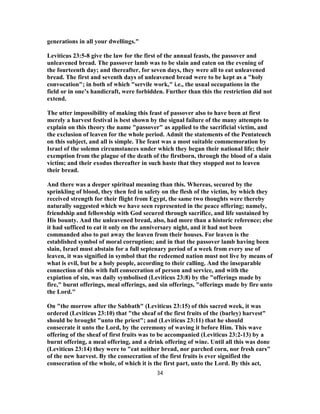

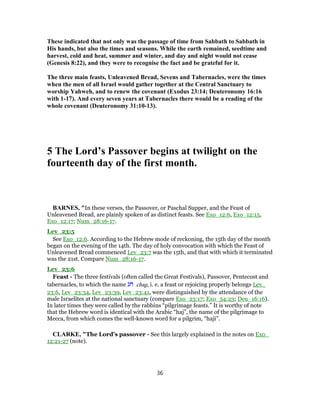
![GILL, "In the fourteenth day of the first month,.... The month Nisan, the same
with Abib, the month in which the children of Israel came out of Egypt, for which reason
it was made the first month in the year, answering to part of our March and part of
April; and for the same reason was the passover kept at this time, as follows:
at even is the Lord's passover; that is, that was the time for the keeping the
passover, even "between the two evenings", as it may be rendered; from the sixth hour
and onward, as Jarchi, trial is, after noon or twelve o'clock the middle of the day, as
Gersom, when the sun began to decline; See Gill on Exo_12:6.
JAMISON, "Lev_23:5-8. The Passover.
the Lord’s passover — (See Exo_12:2, Exo_12:14, Exo_12:18). The institution of
the passover was intended to be a perpetual memorial of the circumstances attending
the redemption of the Israelites, while it had a typical reference to a greater redemption
to be effected for God’s spiritual people. On the first and last days of this feast, the
people were forbidden to work [Lev_23:7, Lev_23:8]; but while on the Sabbath they
were not to do any work, on feast days they were permitted to dress meat - and hence
the prohibition is restricted to “no servile work.” At the same time, those two days were
devoted to “holy convocation” - special seasons of social devotion. In addition to the
ordinary sacrifices of every day, there were to be “offerings by fire” on the altar (see
Num_28:19), while unleavened bread was to be eaten in families all the seven days (see
1Co_5:8).
Leviticus 23:5. In the fourteenth day — See Exodus 12:18. At even — For all the
Jewish festivals were kept from evening to evening, their day beginning in the
evening. Is the Lord’s passover — Exodus 12:11. Though Moses had often before
mentioned this, and several other of their solemnities, he here sets them down all
together, according to the order of time in which they were kept, that this chapter
might serve the Jews for a general table of all their religious festivals.
ELLICOTT, " (5) In the fourteenth day of the first month.—This month is called
Abib in the Pentateuch (Exodus 13:4; Exodus 23:15; Deuteronomy 16:1), and Nisan
in the later books of Scripture (Nehemiah 2:1; Esther 3:7). The fourteenth day of
this month is about the beginning of April. On this day, which was called both “the
preparation for the Passover” (John 19:14), and “the first day of Passover,” all
handicraftsmen, with the exception of tailors, barbers, and laundresses, were
obliged to relinquish work either from morning or from noon, according to the
custom of the different places in Palestine. Leaven was only eaten till midday, and it
had to be burned in the afternoon. The time for desisting from and burning the
leaven was thus indicated: “Two desecrated cakes of thanksgiving offerings were
placed on a bench in the Temple; as long as they were thus exposed all the people
ate leaven. When one of them was removed they abstained from eating, but did not
burn it; but when the other was taken away all the people began burning the
leaven.” It was on this day that every Israelite who was not infirm, ceremonially
37](https://image.slidesharecdn.com/leviticus23commentary-161220145537/85/Leviticus-23-commentary-37-320.jpg)
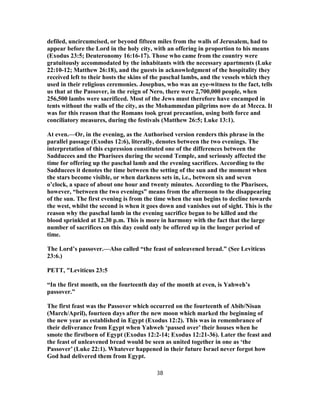
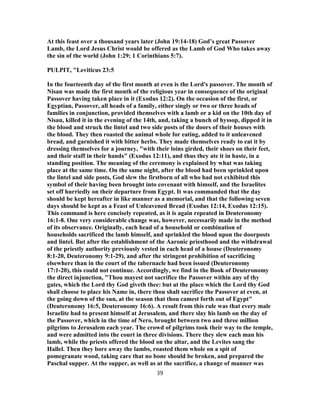

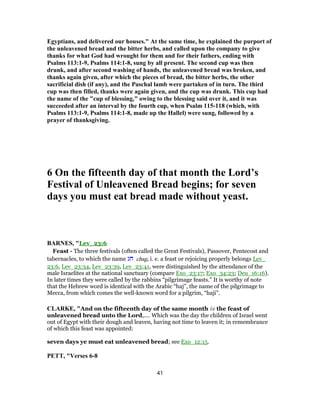

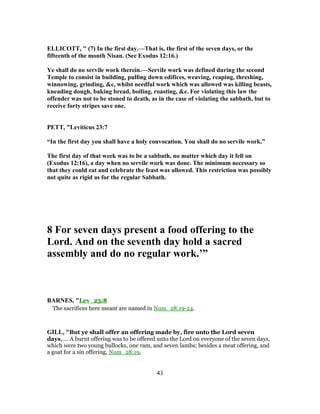
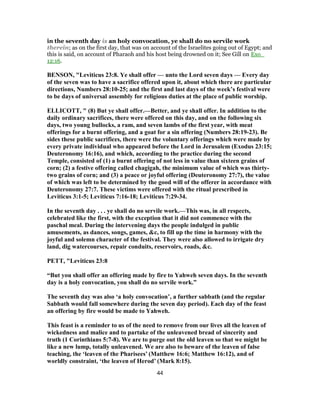

![BARNES, "These verses contain a distinct command regarding the religious services
immediately connected with the grain harvest, given by anticipation against the time
when the people were to possess the promised land.
GILL, "And the Lord spake unto Moses,.... At the same time, for what follow are
the other feasts and holy convocations before spoken of:
COFFMAN, ""And Jehovah spake unto Moses, saying, Speak unto the children of
Israel, and say unto them, When ye are come into the land which I give unto you,
and shall reap the harvest thereof, then ye shall bring the sheaf of the first-fruits of
your harvest unto the priest: and he shall wave the sheaf before Jehovah, to be
accepted for you: on the morrow after the sabbath the priest shall wave it. And in
the day when ye wave the sheaf, ye shall offer a he-lamb without blemish a year old
for a burnt-offering unto Jehovah. And the meal-offering thereof shall be two tenth
parts of an ephah of fine flour mingled with oil, an offering made by fire unto
Jehovah for a sweet savor; and the drink-offering thereof shall be of wine, the
fourth part of a hin. And ye shall eat neither bread, nor parched grain, nor fresh
ears, until this selfsame day, until ye have brought the oblation of your God: it is a
statute forever throughout your generations in all your dwellings."
Lofthouse and other critics, ever anxious to attack the unity of Biblical passages,
assert: "That the chapter is not a unity is shown by the new beginnings in Leviticus
23:9."[10] Such expressions as that found in Leviticus 23:9 are found literally
dozens of times in the O.T., and the use of it again here is no evidence whatever of a
"new beginning." Those who hope to fragment the unity of this chapter must find
something a lot better than that.
"On the morrow after the sabbath shall wave it ..." "These words mean `the day
after the first day of unleavened bread'."[11] The great significance of this lies in the
fact of ultimate fulfillment of the inherent prophecy that Christ would rise from the
dead on "the third day." Christ was crucified on Thursday. Friday was the first day
of unleaven bread. Saturday was the ordinary sabbath. And Sunday was the day
after the morrow of the first day of unleavened bread. Thus, it was the occurrence
during the Passion Week of those back-to-back sabbaths that resulted in the fiftieth
day (the Pentecost) coming on Sunday. (See my commentary on Mark 14:42.)
"The meaning of this phrase has been the subject of much controversy. Is the
sabbath in question the ordinary sabbath, or is it the first day of unleavened bread
(also a sabbath)?"[12] Wenham went on to declare that, "Orthodox Judaism and
most modern commentators favor the second suggestion."[13] Of course, there was
controversy among the Jews over which was meant even in the days of Christ's
earthly ministry. The Pharisees insisted that the sabbath was a weekly sabbath
46](https://image.slidesharecdn.com/leviticus23commentary-161220145537/85/Leviticus-23-commentary-46-320.jpg)
![(Saturday), and the Sadducees made it the "high sabbath" of the first day of
unleavened bread (John 19:31). This old controversy is reflected in the statement of
the gospel of Luke that, "When the day of Pentecost was fully come, they were all
together ... etc." (Acts 2:1) It is a pity that this extremely illuminating passage
should have been changed in our version (American Standard Version), and in the
Douay, RSV and many others. The use of "fully come" shows that there was a
dispute about when it came, that the apostles honored the more extensive count (as
in the second interpretation), and that the Holy Spirit came on the day that the
apostles accepted as Pentecost. It is notable that the apostles did not follow the lead
of the Pharisees. Lightfoot noted that the apostles' Pentecost did not coincide with
the Jewish Pentecost.[14] Dosker also admitted that according to Matthew, Mark,
and Luke, the Passover that year occurred on Thursday, Nisan 14, hence, Passover
fell on Saturday, which, of course, would have been the case if there had been only
one sabbath that week! Dosker was also mystified by the fact that according to
John, the Passover that year occurred on Friday the 14th of Nisan. The back-to-
back sabbaths explain everything connected with this question, which is called "one
of the knottiest problems in harmonizing the Christian gospels."[15] The only thing
that makes this problem difficult, however, is the erroneous tradition that Christ
was crucified on Friday. Add that other sabbath to John's calculations and
Pentecost comes out on Sunday where it belongs. The "sabbath" in Matthew and
Mark was not Saturday at all, but Friday, "the high day" mentioned by John,
namely, the first day of unleavened bread.
"Ye shall bring the sheaf of the first-fruits ..." (Leviticus 23:10). Just as the Passover
was inherently a prophecy of the crucifixion of Christ our Passover, so also the first-
fruits three days later contained the inherent prophecy of the rising of Christ from
the dead "on the third day." "Thus this feast prefigured the resurrection of Christ
as `the first-fruits' from the dead (1 Corinthians 15:23; Romans 8:29)."[16]
"And the drink-offering ..." This verse and Leviticus 23:18,37 are the only mention
of a drink-offering in Leviticus.[17] Apparently, the drink-offering was always the
accompaniment of a greater offering and did not appear to be of the same rank and
importance. How this wine was used was given thus by Josephus: "They bring the
same quantity of oil which they do of wine, and they pour the wine about the
altar."[18]
In later times this feast of the first-fruits came to be called Pentecost, which is
derived from the Greek word meaning "fiftieth," which was reckoned by counting
seven weeks (49 days) plus one day after the Passover. This complete cycle of seven
weeks also resulted in its being called "the Feast of Weeks."
ELLICOTT, "(9) And the Lord spake unto Moses.—As the celebration of the sheaf
of first-fruits formed no part of the original institution of the Passover (Exodus
12:1-20), and as the omer ritual could not be observed in the wilderness, where there
was no sowing of corn, it is here enacted as a prospective part of the feast of
unleavened bread, and hence is introduced by a separate formula.
47](https://image.slidesharecdn.com/leviticus23commentary-161220145537/85/Leviticus-23-commentary-47-320.jpg)

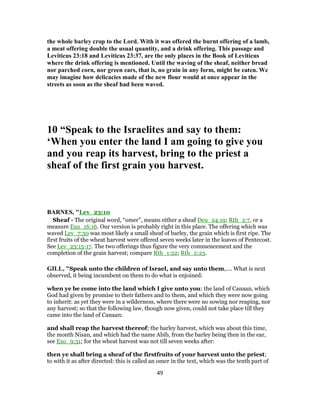


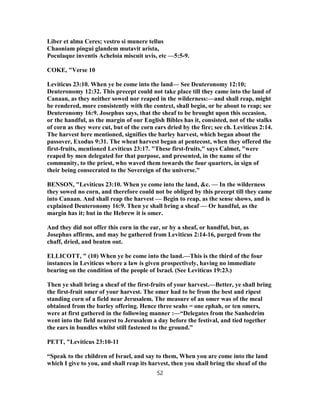
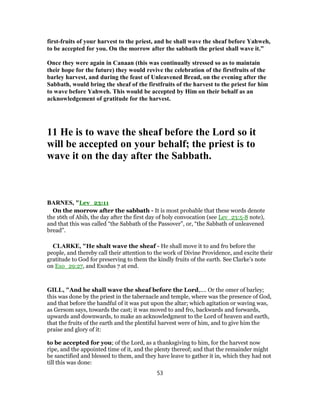

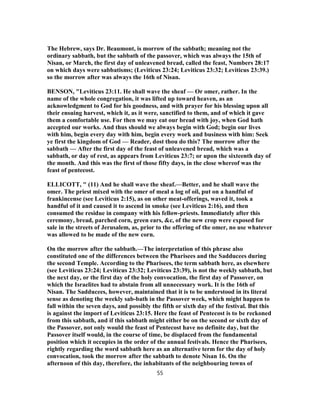
![Jerusalem assembled together “so that the reaping might take place amidst great
tumult.” As soon as it became dark, each of the reapers asked, “Has the sun gone
down?” To which the people replied, “Yes.” They asked twice again, “Has the sun
gone down?” to which the people each time replied, “Yes.” Each reaper then asked
three times, “Is this the scythe? “to which the people each time replied “Yes.” “Is
this the box?” they next asked three times. “Yes,” was again thrice the reply of the
people. “Is this the Sabbath?” the reaper asked three times; and three times the
people replied, “Yes.” “Shall I cut?” he asked three times; and three times the
people replied, “Yes.” When cut it was laid in boxes, brought into the court of the
Temple, threshed with canes and sticks, that the grains might not be crushed, and
laid in a roast with holes, so that the fire might touch each grain. Thereupon it was
spread in the court of the sanctuary for the wind to pass over it, and ground in a
barley mill which left the hulls unground. The flour thus obtained was sifted
through thirteen different sieves, each one finer than its predecessor. In this manner
was the prescribed omer or tenth part got from the seah.
TRAPP, "Leviticus 23:11 And he shall wave the sheaf before the LORD, to be
accepted for you: on the morrow after the sabbath the priest shall wave it.
Ver. 11. And he shall wave the sheaf.] This signified that they and theirs were
accepted of God through Christ.
On the morrow after the Sabbath.] Here the Lord’s day was prefigured, saith one,
therefore prescribed, and instituted of God. This shake day sheaf was a pregnant
type of Christ’s rising again, the firstfruits from the dead. It was fulfilled in Christ’s
resurrection, the day after the Sabbath. And because this Sabbath was chiefly
meant of the Passover (which was a high Sabbath) it was a double Sabbath wherein
Christ rested in the grave. The very next morning was Christ waved before the
Lord, when, in the earthquake, he rose from the dead "the firstfruits of them that
sleep," and there hence entered the everlasting gates as a King of glory, [Psalms
24:7] which psalm is in the Greek called A psalm of David of the first day of the
week.
12 On the day you wave the sheaf, you must
sacrifice as a burnt offering to the Lord a lamb a
year old without defect,
56](https://image.slidesharecdn.com/leviticus23commentary-161220145537/85/Leviticus-23-commentary-56-320.jpg)
![GILL, "And ye shall offer that day, when ye wave the sheaf,.... Besides the daily
sacrifice of the morning and evening, and the additional offerings made on everyone of
the seven days of the feast of unleavened bread:
an he lamb without blemish of the first year, for a burnt offering unto the
Lord; typical of the perfect and immaculate Lamb of God, whose sufferings are fitly
signified by a burnt offering; and which were endured at the time he became the
firstfruits of his people, and sanctified them.
PETT, "Leviticus 23:12-13
“And in the day when you wave the sheaf, you shall offer a he-lamb without blemish
a year old for a whole burnt offering to Yahweh. And its grain offering shall be two
tenth parts of an ephah of fine flour mingled with oil, an offering made by fire to
Yahweh for a pleasing odour; and its drink-offering shall be of wine, the fourth part
of a hin.”
On the same day a whole burnt offering of a year old lamb would be offered
together with a grain offering (seven litres) mingled with oil and a drink offering
(1:7 litres) of wine. These would be offerings made by fire to Yahweh, and their
offering would give Him pleasure, arising as a pleasing odour. Each of these
represented an expression of gratitude to God. for the gift of lambs, the gift of
barley harvest and the gift of wine.
13 together with its grain offering of two-tenths of
an ephah[a] of the finest flour mixed with olive
oil—a food offering presented to the Lord, a
pleasing aroma—and its drink offering of a
quarter of a hin[b] of wine.
BARNES, "Lev_23:13
Two tenth deals - Two omers, or tenth parts of an ephah, about a gallon and three
quarters. See Lev_19:36 note. The double quantity (contrast Exo_29:40; Num_15:4;
Num_28:19-21), implying greater liberality, was appropriate in a harvest feast.
57](https://image.slidesharecdn.com/leviticus23commentary-161220145537/85/Leviticus-23-commentary-57-320.jpg)
![Drink offering - This and Lev_23:18, Lev_23:37 are the only places in the book of
Leviticus in which drink-offerings are mentioned. See the Exo_29:40 note.
GILL, "And the meat offering thereof shall be two tenth deals of fine flour
mingled with oil,.... The usual measure of flour to a meat offering was one tenth deal,
Exo_29:40; but here it is doubled: some Jewish writers say (p) one tenth was on account
of the lamb that was offered at this time, and the other as was suitable for a meat
offering; but the true reason seems to be, because it was on account of the fruits of the
earth and the plenty thereof; and therefore a double measure of fine flour mixed with oil
was required as a token of gratitude; for thankfulness ought to be in proportion to
mercies:
an offering made by fire unto the Lord for a sweet savour; an handful of it was
burnt upon the altar, and was received with acceptance by the Lord, and the rest was
eaten by the priests, Lev_2:2,
and the drink offering thereof shall be of wine, the fourth part of an hin;
which was the common quantity for a drink offering, Exo_29:40; for, as Jarchi observes,
though the meat offering was doubled, the drink offering was not; the reason of which
seems to be, because these offerings were on account of the harvest and not the vintage:
the Targum of Jonathan calls it wine of grapes, to distinguish it from wine that might be
made of other things, but not to be used in drink offerings, only the pure juice of the
grape.
BENSON, "Leviticus 23:13. Two tenth-deals — Or parts, of an ephah; that is, two
omers; whereas in other sacrifices of lambs there was but one tenth-deal prescribed.
The reason of which disproportion may be this; that one of the tenth-deals was a
necessary attendant upon the lamb, and the other was peculiar to this feast, and was
an attendant upon the oblation of the corn, and was offered with it in thanksgiving
to God for the fruits of the earth.
ELLICOTT, "(13) Two tenth deals of fine flour.—Ordinarily only one-tenth deal of
fine Hour was required for a meat-offering (Exodus 29:40; Numbers 15:4; Numbers
28:9; Numbers 28:13, &c.), to exhibit the plentiful harvest. With the exception of the
handful of flour and oil, and of all the frankincense, this meat-offering was the
perquisite of the priests. (See Leviticus 2:2-3.)
TRAPP, "Leviticus 23:13 And the meat offering thereof [shall be] two tenth deals of
fine flour mingled with oil, an offering made by fire unto the LORD [for] a sweet
savour: and the drink offering thereof [shall be] of wine, the fourth [part] of an hin.
Ver. 13. Two tenth deals.] This was double to the ordinary proportion, [Numbers
15:4] because on such an occasion.
58](https://image.slidesharecdn.com/leviticus23commentary-161220145537/85/Leviticus-23-commentary-58-320.jpg)


![“And you shall eat neither bread, nor parched grain, nor fresh ears, until this
selfsame day, until you have brought the oblation of your God. It is a statute for
ever throughout your generations in all your dwellings.”
Until this oblation and firstfruit was offered to God they were not to partake of
anything to do with the harvest. They must eat neither bread, nor parched grain nor
fresh ears. God’s goodness must be acknowledged first.
The firstfruit reminds us of many things. It reminds us that we must never be slow
in expressing our gratitude to God for His provision. We have much to be grateful
for and we must not be like the healed lepers of whom only one returned to Jesus to
give thanks (Luke 17:17). It reminds us that we must continually give thanks for
Jesus Christ Who is the firstfruits of the resurrection (1 Corinthians 15:20). And it
reminds us that we who have been begotten again by Him are the firstfruits of His
creation (James 1:18)
TRAPP, "Leviticus 23:14 And ye shall eat neither bread, nor parched corn, nor
green ears, until the selfsame day that ye have brought an offering unto your God:
[it shall be] a statute for ever throughout your generations in all your dwellings.
Ver. 14. And ye shall eat neither bread.] It was fit that God the giver should have
the first.
The Festival of Weeks
15 “‘From the day after the Sabbath, the day you
brought the sheaf of the wave offering, count off
seven full weeks.
BARNES, "Lev_23:15
The morrow after the sabbath - See Lev_23:11 note.
Seven sabbaths - More properly, seven weeks (compare Deu_16:9). The word
Sabbath, in the language of the New Testament as well as the Old, is used for “week”
61](https://image.slidesharecdn.com/leviticus23commentary-161220145537/85/Leviticus-23-commentary-61-320.jpg)
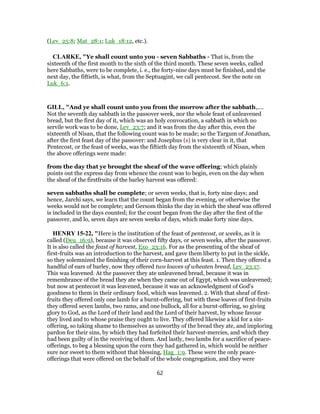
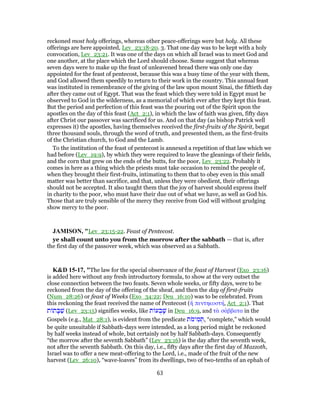
![fine flour baked leavened, like the bread which served for their daily food, “as first-fruits
unto the Lord,” and of the wheat-harvest (Exo_34:22), which fell in the second half of
May and the first weeks of June (Robinson, Palestine), and therefore was finished as a
whole by the feast of Weeks. The loaves differed from all the other meat-offerings, being
made of leavened dough, because in them their daily bread was offered to the Lord, who
had blessed the harvest, as a thank-offering for His blessing. They were therefore only
given to the Lord symbolically by waving, and were then to belong to the priests (Lev_
23:20). The injunction “out of your habitations” is not to be understood, as Calvin and
others suppose, as signifying that every householder was to present two such loaves; it
simply expresses the idea, that they were to be loaves made for the daily food of a
household, and not prepared expressly for holy purposes.
COFFMAN, ""And ye shall count unto you from the morrow after the sabbath,
from the day that ye brought the sheaf of the wave-offering; seven sabbaths shall
there be complete: even unto the morrow after the seventh sabbath shall ye number
fifty days; and ye shall offer a new meal-offering unto Jehovah. Ye shall bring out of
your habitations two wave-loaves of two tenth parts of an ephah: they shall be of
fine flour, they shall be baken with leaven, for first-fruits unto Jehovah. And ye
shall present with the bread seven lambs without blemish a year old, and one young
bullock, and two rams: they shall be a burnt-offering unto Jehovah, with their meal-
offering, and their drink-offerings, even an offering made by fire, of a sweet savor
unto Jehovah. And ye shall offer one he-goat for a sin-offering, and two he-lambs a
year old for a sacrifice of peace-offerings. And the priest shall wave them with the
bread of the first-fruits for a wave-offering before Jehovah, with the two lambs:
they shall be holy to Jehovah for the priest. And ye shall make proclamation on the
selfsame day; there shall be a holy convocation unto you; ye shall do no servile
work: it is a statute forever in of all your dwellings throughout your generations."
"A new meal-offering ..." This was to be new in several ways:
(1) It would be from a new crop.
(2) It would be of a new kind of grain (wheat), barley being used for the first-fruits
(Leviticus 23:13). "The Talmudic tradition is that this offering was wheat, whereas
the first-fruits was of barley."[19]
(3) The loaves would be baked with leaven (Leviticus 23:17), contrasting with the
bread of the feast of unleavened bread.
(4) This "newness" prefigured the coming of the Gentiles (a new kind of people) into
God's church, which began on Pentecost, with the significant fact (typified by the
leaven) that there would continue an element of evil within the holy church itself.
This latter fact received emphasis from Jesus Christ in the great parables of the
kingdom which represented the "tares" growing in the wheat, and the "good and
bad fishes alike" being encompassed within the visible structure of it (See Matthew
64](https://image.slidesharecdn.com/leviticus23commentary-161220145537/85/Leviticus-23-commentary-64-320.jpg)
![13).
(5) The use of leavened bread on this occasion may also have indicated that,
"complete and final redemption was not yet attained by the church,[20] but that her
probation had begun.
PENTECOST. The great festival proclaimed here was that of the fiftieth day, or
Pentecost, as reckoned from the day after the morrow of the first day of unleavened
bread. (See Leviticus 23:11.) This was the first day of the week, Sunday, the day of
the week on which Jesus rose from the dead, the church was begun, and that of
successive appearances of Jesus Christ to his disciples assembled for Lord's Day
worship. (See the extended comment on "Pentecost" in my commentary on Acts
2:1.)
"Ye shall offer a new meal-offering ..." (Leviticus 23:16). Orlinsky gave the meaning
here as, "An offering of new grain,"[21] but, as indicated by subsequent Jewish
practice, it might also have included the meaning of "a new kind of grain." (Wheat
instead of barley).
"Two wave-loaves ... baken with leaven ..." (Leviticus 23:17). Why two loaves?
Unger was of the opinion that, "This anticipated the N.T. Pentecost when, under the
administration of the Holy Spirit, both Jews and Gentiles were baptized into union
with the glorified Christ."[22]
COKE, "Leviticus 23:15. Ye shall count unto you from the morrow after the
sabbath— From the second day of unleavened bread, Leviticus 23:7; Leviticus 23:11
that is, from the 16th day of the first month, they were to reckon seven sabbaths, i.e.
seven weeks complete; and the next day after the seventh sabbath or week, making
just 50 days, was to be the first of another festival, hence commonly called pentecost
or the fiftieth; when the first-fruits of the wheat harvest were to be offered,
Leviticus 23:17. This festival was partly commemorative of God's goodness in giving
the law from mount Sinai, on the 50th day after their coming out of Egypt; and
partly gratulatory for the fair hope of completing their harvest; and it was also
typical of the gospel law; see Exodus 19:1 and Acts 2:1; Acts 2:47. Archbishop
Usher observes, that our blessed Lord being slain at the feast of the passover, rested
in his grave the whole sabbath following, which was the day of unleavened bread.
The next day after, the sheaf or omer of the first-fruits, of barley-harvest was
offered to the Lord; when Christ rose from the dead, and became the first-fruits of
them that slept: from this day the account of the seven sabbaths or weeks was
computed; and upon the morrow after the seventh, i.e. upon the Lord's day, was
celebrated the feast of weeks, or the day of the first-fruits; because then the first-
fruits of the second, or wheat harvest were offered; as likewise the feast of harvest;
because it was the principal and last harvest of the year. On this day the apostles,
having themselves received the first-fruits of the spirit, converted no less than 3000
souls, and presented them, as the first-fruits of the Christian church, to God. Now
the seventh day of the week, or Jewish sabbath, being purposely passed over in the
65](https://image.slidesharecdn.com/leviticus23commentary-161220145537/85/Leviticus-23-commentary-65-320.jpg)

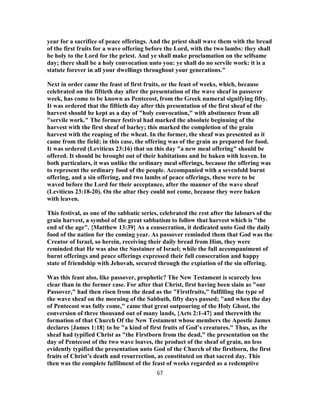
![type, showing how, not only rest, but also redemption was comprehended in the
significance of the sabbatic idea. And yet, that complete redemption was not
therewith attained by that Church of the firstborn on Pentecost was presignified in
that the two wave loaves were to be baken with leaven. The feast of unleavened
bread had exhibited the ideal of the Christian life; that of first fruits, the
imperfection of the earthly attainment. On earth the leaven of sin still abides.
PETT, "Verses 15-22
The Feast of Sevens (Weeks) or Harvest - Pentecost (Leviticus 23:15-22).
This was a one day feast (Deuteronomy 16:9-12) to be held fifty days after
unleavened bread.
Leviticus 23:15-16
“And you shall count unto you from the morrow after the sabbath, from the day
that you brought the sheaf of the wave-offering, seven sabbaths shall there be
complete, even to the morrow after the seventh sabbath shall you number fifty days;
and you shall offer a new meal-offering to Yahweh.”
From the second day of unleavened bread, the day after the initial Sabbath, the day
of waving of the sheaf of the wave-offering, seven seven day periods ending with the
Sabbath are to be measured, and then on the next day, the fiftieth, the feast of
sevens is to be celebrated. This was a joyous feast which celebrated the gathering of
the harvest and expressed gratitude to God for His provision of food.
Note the continual emphasis on ‘sevens’. Unleavened Bread lasts seven days, and
then seven sevens lead up to the fiftieth day Feast of Sevens. The final feast will be in
the seventh moon period. This divinely perfect and sacred number underlines all.
TRAPP, "Leviticus 23:15 And ye shall count unto you from the morrow after the
sabbath, from the day that ye brought the sheaf of the wave offering; seven sabbaths
shall be complete:
Ver. 15. Seven Sabbaths.] That is, seven weeks. The Sabbath is queen of all the days
of the week; and therefore carries the name of the whole week.
SIMEON, "FEAST OF FIRST-FRUITS
Leviticus 23:15-17. And ye shall count unto you from the morrow after the Sabbath,
from the day that ye brought the sheaf of the wave-offering; seven Sabbaths shall be
complete: even unto the morrow after the seventh Sabbath shall ye number fifty
days; and ye shall offer a new meat-offering unto the Lord. Ye shall bring out of
your habitations two wave-loaves, of two tenth deals: they shall be of fine flour; they
shall be baken with leaven; they are the first-fruits unto the Lord.
68](https://image.slidesharecdn.com/leviticus23commentary-161220145537/85/Leviticus-23-commentary-68-320.jpg)
![THERE is no blessing which is not enhanced by a sense of reconciliation and
acceptance with God. An ungodly man has his very provisions cursed to him [Note:
Deuteronomy 28:16-19.] ; whilst to the righteous “God hath given all things richly to
enjoy.” Indeed, it is to present, no less than to future, happiness, that God calls his
people. He bids us weep, it is true; but he no-where bids us to be always mourning:
on the contrary, he commands us to “rejoice in him always, yea, to “rejoice
evermore:” and assures us, that, though our “weeping may endure for a night, joy
shall come in the morning.” We have this beautifully exemplified in the
appointments under the law. One day in the year was appointed for national
humiliation, namely, the day of atonement, wherein all were commanded to afflict
their souls: but the very next day, and the whole week following it, was appointed
for a feast [Note:, 6.] ; by which appointment it was clearly intimated, that they who
had obtained reconciliation with God through the atonement of Christ, had reason
to rejoice throughout the whole remainder of their lives.
The week succeeding the Passover was called “the feast of unleavened bread:” on
the first day of which they were to present to God a sheaf of newly reaped barley;
and, fifty days after that, two loaves of wheaten bread; both of them being the first-
fruits, the one of the barley harvest, and the other of the wheat. Hence these two
periods were called the feasts of “first fruits:” and the appointment of them may be
considered in a three-fold view; as,
I. Commemorative—
[The day on which the sheaf of barley was to be presented unto God, was that on
which they had come out of Egypt: and it was to be kept in commemoration of that
event; that, when they were enjoying the peaceful fruits of industry, they might call
to mind the labour and travail they had endured in the land of their captivity.
The fiftieth day after that, was the day on which the law of God had been delivered
to them from Mount Sinai. This was no less a mercy than the former: for whilst by
the former they were rescued from bondage to men, by the latter they were brought
into the service of God [Note: The two are spoken of precisely in this way, as
equalled by each other, but by nothing else. Deuteronomy 4:32-35.].
Both of these events were to be remembered on the days thus set apart [Note:
Deuteronomy 16:9; Deuteronomy 16:12.], in order that He who had done such great
things for their bodies and their souls, might have the glory due unto his name.
And here we cannot but observe, how beneficial it is to the Church to have
particular times set apart for the special remembrance of the various wonders of
redemption. If indeed the observance of such institutions were required of us as
necessary to salvation, or inculcated as contributing to work out for us a justifying
righteousness, or represented as superseding the necessity of a more frequent
remembrance of them, or enjoined, as Jeroboam’s was, in opposition to the
69](https://image.slidesharecdn.com/leviticus23commentary-161220145537/85/Leviticus-23-commentary-69-320.jpg)
![commands of God [Note: 1 Kings 12:33.], we should be ready to join with those who
reprobate such appointments. But experience proves, that the appointment of
seasons for the distinct consideration of particular subjects, has been productive of
the greatest good; and that the more solemnly those seasons are devoted to the
special purposes for which they are set apart, the more will humility, and every
Christian grace, flourish in the soul. And, if the annual remembrance of an earthly
deliverance was pleasing and acceptable to God, there can be no reasonable doubt,
but that the annual commemoration of infinitely richer mercies (provided only that
we guard against self-righteousness and superstition) must be pleasing to him also.]
But these feasts derived a still greater importance from being,
II. Typical—
[Two of the greatest events which ever happened from the foundation of the world,
and which are the source and warrant of all our hopes, occurred on the days
appointed for these feasts, and were typically prefigured by them.
On the former of those days, that I mean on which the Israelites came out of their
graves in Egypt, (which was the first-fruits of their deliverance, as the wave-sheaf
was of the barley harvest,) Christ rose from the dead, and rose, not as an individual,
but “as the first-fruits of them that slept [Note: 1 Corinthians 15:20.] ;” and has
thereby assured to us the resurrection of all his people to a life of immortality and
glory [Note: 1 Corinthians 15:21-23.].
On the latter of those clays, namely, the fiftieth day, on which the law was given,
(which, like the first-fruits of the wheat harvest, was the pledge and earnest of those
mercies which they were afterwards to enjoy under the immediate government of
God,) on that day, I say, the Holy Ghost was poured out upon the Apostles [Note:
Acts 2:1. “Pentecost” means the fiftieth day; for which, it is evident, the
communication of this blessing was reserved: and it was communicated when that
day “was fully come.”], who then “received the first-fruits of the Spirit [Note:
Romans 8:23.].” As on that day God had proclaimed his law, so on that day he
promulged his Gospel; and gathered to himself three thousand souls, who were the
first-fruits of that glorious harvest [Note: Revelation 14:4.], which shall in due time
be reaped, when “all shall know the Lord from the least even to the greatest,” and
“all the kingdoms of the world become the kingdom of the Lord and of his Christ.”
In these views the feasts of which we are speaking become exceedingly important. It
is true, they were but shadows, and very obscure shadows too: but to us who have
the substance, and on whom “the true light shineth,” they are worthy of most
attentive consideration; as being the first rude drafts or models of that glorious
edifice which we inhabit.]
But these feasts are of further use to us, as,
70](https://image.slidesharecdn.com/leviticus23commentary-161220145537/85/Leviticus-23-commentary-70-320.jpg)
![III. Instructive—
[There is not any thing which we are more interested to know than our obligations
to God, and our consequent duty towards him: yet these are clearly and strongly
represented to us in the ordinances before us.
Behold our obligations to God. In each of these feasts the first-fruits were “waved”
before God [Note: 1, 17], in token that every earthly blessing was derived from him.
This was done in the name of the whole congregation; so that, whatever diligence or
skill any had used in the cultivation of their land, they did not arrogate any thing to
themselves, but gave glory to Him “from whom alone proceeds every good and
perfect gift.” Happy would it be for us, if we also learned this lesson, so as to have
our minds duly impressed with the goodness of our God! — — —].
Corresponding with our obligations to God is our duty towards him. If we have
received every thing from him, it is our bounden duty to devote every thing to him,
and improve every thing for the honour of his name. And, as at the former of these
feasts they offered only one sheaf, and one lamb, but at the latter they presented two
loaves, and seven lambs [Note: 2, 18.], so, in proportion as God has multiplied his
mercies towards us, we also should enlarge our exercises of gratitude, liberality, and
devotion.
Shall these sentiments be thought an undue refinement on the subject before us?
They are the very sentiments which God himself suggests in reference to these very
institutions. We are expressly told in this view to honour him with all that we have,
and all that we are. Have we property? “We must “honour the Lord with our
substance, and with the first-fruits of all our increase:” and, lest that should be
thought likely to impoverish us, and it should be deemed advisable rather to gather
in our harvest first, and then give him out of our abundance, he particularly guards
us against any such covetous and distrustful thoughts, and tells us that a believing
and thankful dedication of our first-fruits is the most likely way to ensure to
ourselves an abundant harvest [Note: Proverbs 3:9-10.]. Alas! how melancholy it is
that, when we are receiving so many harvests at God’s hands, not a few of us are
found to grudge him even a sheaf!
But it is not our property only that we should devote to God: we should give him our
whole selves. We are told that “God hath set apart him that is godly for himself
[Note: Psalms 4:3.],” exactly as he did the first-fruits of old, of which it would have
been sacrilege to rob him: and every one that professes a hope in Christ is called
upon to consider himself in that very view, namely, “as a kind of first-fruits of his
creatures [Note: James 1:18.].” Yes, Beloved, “we are not our own; we are
redeemed, and bought with a price: and therefore are bound to glorify God with our
bodies and our spirits, which are his [Note: 1 Corinthians 6:19-20.].”
Only let these instructions be impressed upon our minds, and exemplified in our
lives, and then we shall make the best possible improvement of these typical
71](https://image.slidesharecdn.com/leviticus23commentary-161220145537/85/Leviticus-23-commentary-71-320.jpg)
![institutions. Yea, whether we contemplate the types or the things typified, the
improvement of them must be the same. From the resurrection of Christ we must
learn to rise again to newness of life; and from the outpouring of the Spirit we must
learn to cherish and obey his sanctifying operations. Thus will both Law and Gospel
be transcribed into our lives, and God be glorified in all his dispensations.]
PULPIT, "Leviticus 23:15-21
The Feast of Pentecost lasted but one day. From the morrow after the sabbath—that
is, from the second day of Unleavened Bread—the day that ye brought the sheaf of
the wave offering; seven sabbaths, i.e; weeks, were to be counted, making forty-nine
days, and on the day following the completion of the seventh sabbath (meaning here
the seventh week), the festival was to be held, whence its later name of Pentecost, or
Fiftieth-day Feast. It would have fallen about the beginning of June—a season of the
year which would have made the journey to Jerusalem easy. The characteristic
offering of the day was that of two wave loaves of two tenth deals … of fine flour …
baken with leaven. These loaves were regarded as the firstfruits unto the Lord of the
wheat harvest, although the greater part of the crop had now been reaped and
housed. They were to be leavened and brought out of your habitations; that is, they
were to consist of such bread as was ordinarily used in daily life. They were made
out of ears of wheat selected and cut like the barley in the Feast of Unleavened
Bread, and then threshed and ground in the temple court. Each loaf contained an
omer of flour, amounting to about five pints, and would therefore have weighed
about five pounds. With these were offered two lambs, which were waved before the
Lord by being led backwards and forwards before the tabernacle or the temple, and
then the loaves were waved also, but they were not placed upon the altar, as they
were leavened. The twentieth verse, which is somewhat obscure in the Authorized
Version, should be punctuated as follows. And the priest shall wave them (the two
lambs) with the bread of the firstfruits (the two loaves) for a wave offering before
the Lord; with the two lambs they (the loaves) shall be holy to the Lord for the
priest. The other sacrifices to be offered on this day are described in the text as
seven lambs,… one young bullock, and two rams … for a burnt offering unto the
Lord, with their meat offering, and their drink offerings,… and one kid of the goats
for a sin offering. In the Book of Numbers (Numbers 28:27) they are stated to be
"seven lambs," "two young bullocks," "one ram," with meat and drink offerings,
and "one kid of the goats." Seeing that in Leviticus one young bullock and two rams
are commanded, and in Numbers "two young bullocks and one ram," it is
reasonable to suppose that a copyist's error has found its way into one or the other
text. The feast was to be kept as a day of holy convocation, and no servile work was
to be done upon it. The number of sacrifices offered by individuals who had come to
Jerusalem caused the festivity to be in practice continued for several days
subsequent to the festival itself.
72](https://image.slidesharecdn.com/leviticus23commentary-161220145537/85/Leviticus-23-commentary-72-320.jpg)

![16:10; Deuteronomy 16:16; 2 Chronicles 8:13). The fiftieth day, according to the
Jewish canons, may fall on the 5th, 6th, or 7th of Sivan, the third month of the year,
i.e., from the new moon of May to the new moon of June.
Shall offer a new meat offering.—That is, of the first-fruits of the wheat-harvest in
contradistinction to the omer first-fruits, which was of barley-harvest. Hence this
festival is also called “the feast of harvest” (Exodus 23:16), because it concluded the
harvest of the later grain.
TRAPP, "Verse 16
Leviticus 23:16 Even unto the morrow after the seventh sabbath shall ye number
fifty days; and ye shall offer a new meat offering unto the LORD.
Ver. 16. Shall ye number fifty days.] And then keep the feast of Pentecost or of
weeks, so called because it was seven weeks after the passover.
17 From wherever you live, bring two loaves made
of two-tenths of an ephah of the finest flour,
baked with yeast, as a wave offering of firstfruits
to the Lord.
BARNES, "Lev_23:17
Habitations - Not strictly houses, but places of abode in a general sense. It seems
here to denote the land in which the Israelites were to dwell so as to express that the
flour was to be of home growth. The two loaves were to be merely waved before Yahweh
and then to become the property of the priests. No bread containing leaven could be
offered on the altar (see the Lev_2:11 note). The object of this offering seems to have
been to present to the Lord the best produce of the earth in the actual condition in which
it is most useful for the support of human life. It thus represented in the fittest manner
the thanksgiving which was proper for the season. The loaves appear to be distinctively
called “the first fruits for Yahweh,” and references to them are found in Rom_11:16;
1Co_15:20, 1Co_15:23; Jam_1:18; Rev_14:4, etc. As these loaves offered before Yahweh
sanctified the harvest of the year, so has “Christ the firstfruits” sanctified the Church,
which, in its union with Him as the firstfruits, becomes also the Sanctifier of the world.
74](https://image.slidesharecdn.com/leviticus23commentary-161220145537/85/Leviticus-23-commentary-74-320.jpg)

![BENSON, "Leviticus 23:17. Two wave loaves of two tenth-deals — There was one
tenth-deal in each loaf. They were called wave-loaves, because they were presented
to God by waving them toward heaven. Baken with leaven — Contrary to the
established law in other bread or flower offerings, Leviticus 2:11-12. The reason
may be, that these first-fruits were a symbol of the leavened bread which the
Israelites commonly used.
ELLICOTT, " (17) Ye shall bring out of your habitations.—During the second
Temple this clause was taken to be elliptical, and to denote ye shall bring out of, or
from, the land of your habitations, that is, from Palestine (Numbers 15:2).
Two wave loaves of two tenth deals.—These two loaves were prepared in the
following manner. Three seahs of new wheat were brought into the court of the
Temple, were beaten and trodden and ground into flour. Two omers of the flour
were respectively obtained from a seah and a half, and after having been sieved in
the twelve different sieves, were kneaded separately with leaven into two loaves
outside the Temple, but were baked inside the sanctuary on the day preceding the
festival. Each loaf was seven hand-breadths long, four hand-breadths broad, and
five fingers high. These were offered to the Lord as firstlings (Exodus 34:17),
whence this festival is also called “the day of first-fruits” (Numbers 28:26).
PETT, "Leviticus 23:17
“You shall bring out of your habitations two wave-loaves of two tenth parts of an
ephah: they shall be of milled grain, they shall be baked with leaven, for first-fruits
to Yahweh.”
In recognition of this gratitude two wave-loaves made of milled grain (about seven
litres), baked with leaven (a rare use of leaven), were brought as first-fruits to
Yahweh. Leaven could be offered as firstfruits, but not as an offering made by fire
(Leviticus 2:11). They were waved before Yahweh as an offering to Him, firstfruits
of the final harvest, although their final destination was the priests.
The deliberate change from unleavened to leavened may indicate the difference
between the firstfruits of the harvest (when there would have been no time for it to
leaven) and the finally gathered in harvest when leavened dough would be plentiful
and rejoiced in.
TRAPP, "Leviticus 23:17 Ye shall bring out of your habitations two wave loaves of
two tenth deals: they shall be of fine flour; they shall be baken with leaven; [they
are] the firstfruits unto the LORD.
Ver. 17. Out of your habitations.] That is, Out of the new corn (growing of the same
land which God gave them to inherit) not foreign.
76](https://image.slidesharecdn.com/leviticus23commentary-161220145537/85/Leviticus-23-commentary-76-320.jpg)
![The firstfruits,] viz., Of their wheat harvest, as the shake sheaf [Leviticus 23:10] was
of their barley harvest. Thus were they to express their thankfulness to God for
those precious fruits of the earth. [James 5:7]
18 Present with this bread seven male lambs, each
a year old and without defect, one young bull and
two rams. They will be a burnt offering to the
Lord, together with their grain offerings and
drink offerings—a food offering, an aroma
pleasing to the Lord.
BARNES, "Lev_23:18
More properly, seven sheep of a year old (to be distinguished from the lamb in Lev_
23:12), and a young bull which might be from one to three years old. Compare Num_
28:26-27.
GILL, "And ye shall offer with the bread seven lambs without blemish,
of the first year,.... That is, with the two wave loaves, the meat or bread offering: and
besides these:
and one young bullock, and two rams; in Num_28:27 it is two young bullocks, and
one ram; and Aben Ezra suggests, that this was at the will and option of the priest,
whether one bullock and two rams, or two bullocks and one ram; but according to
Maimonides (x), these sacrifices were distinct from them; they are sacrifices of the day,
as being a feast day, and these belonged to the loaves; so that according to him, and so
he expresses it, there were to be offered on this day, besides the daily sacrifices, three
bullocks, three rams, and fourteen lambs, twenty beasts in all, for burnt offerings; and
two goats for sin offerings to be eaten, and two lambs for peace offerings to be eaten; and
with this account agrees Josephus (y), they sacrifice for burnt offerings, he says, three
bullocks, and two rams, (or, as Dr. Bernard thinks, it should be read three rams,) and
fourteen lambs, and two goats for sin offerings:
they shall be for a burnt offering unto the Lord, with their meat offering,
and their drink offering; each of the said beasts were offered, unto the Lord on the
altar of burnt offering, and burnt thereon; and to every beast they offered, there was a
77](https://image.slidesharecdn.com/leviticus23commentary-161220145537/85/Leviticus-23-commentary-77-320.jpg)
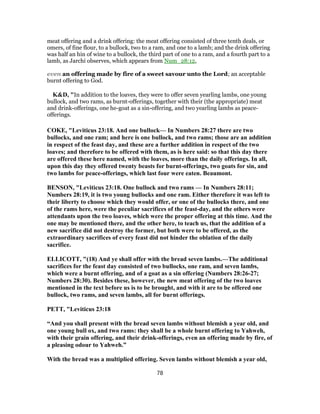
![one young bull ox and two rams were to be offered as whole burnt offerings to
Yahweh, each with its usual grain and drink offerings. These made up an offering
made by fire, a pleasing odour to Yahweh. This multiplied offering was a
demonstration of rededication and tribute, a joyous response to God’s love and
goodness revealed in the harvest.
TRAPP, "Leviticus 23:18 And ye shall offer with the bread seven lambs without
blemish of the first year, and one young bullock, and two rams: they shall be [for] a
burnt offering unto the LORD, with their meat offering, and their drink offerings,
[even] an offering made by fire, of sweet savour unto the LORD.
Ver. 18. Seven lambs.] Besides which, they had other oblations at the feast of
Pentecost. [Numbers 28:27] The service of God was heretofore very costly.
19 Then sacrifice one male goat for a sin
offering[c] and two lambs, each a year old, for a
fellowship offering.
BARNES, "Lev_23:19
Properly, a shaggy he-goat Lev_4:23 and two sheep of a year old.
GILL, "Then ye shall sacrifice one kid of the goats for a sin offering,.... Which
was for the sin of the whole congregation, typical of Christ, whose soul was made an
offering for sin; in virtue of which all other sacrifices become acceptable to God, and
believers enjoy the fruits and blessings of divine grace:
and two lambs of the first year for a sacrifice of peace offerings; which
Gersom says were the most holy things, and were only slain in the north, and only eaten
by males, as the rest of the holy things, and are the only peace offerings of the
congregation that were offered throughout the whole year.
BENSON, "Leviticus 23:19. One kid — In Leviticus 4:14, the sin-offering for the sin
of the people is a bullock, but here a kid, &c.; the reason of the difference may be
this: because that was for some particular sin of the people, but this only in general
for all their sins.
ELLICOTT, "(19) Then ye shall sacrifice.—Better, and ye shall sacrifice. They
79](https://image.slidesharecdn.com/leviticus23commentary-161220145537/85/Leviticus-23-commentary-79-320.jpg)

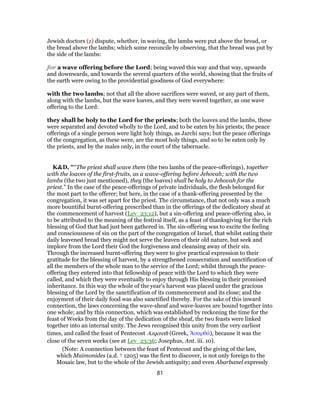
![denies it.)
BENSON, "Leviticus 23:20. Wave them — Some part of them, in the name of the
whole; and so for the two lambs otherwise they had been too large and too heavy to
be waved. For the priests — Who had to themselves not only the breast and
shoulder, as in other sacrifices which belonged to the priest, but also the rest which
belonged to the offerer; because the whole congregation being the offerers here, it
could neither be distributed to them all, nor given to some without offence to the
rest.
ELLICOTT, "(20) And the priest shall wave them . . . with the two lambs.—During
the second Temple this was done in the following manner :—The two lambs were
brought into the Temple, and waved together or separately by the priest while yet
alive. Whereupon they were slain, and the priest took the breast and shoulder of
each one (see Leviticus 7:30-32), laid them down by the side of the two loaves, put
both his hands under them, and waved them all together or separately towards the
east side forwards and backwards, up and down. He then burned the fat of the two
lambs, after which the remainder of the flesh, which became the perquisite of the
officiating priest, was eaten by him and his fellow-priests. Of the two loaves the high
priest took one, and the other was divided between the officiating priests, who had
to eat them up within the same day and half the following night, just as the flesh of
the most holy things. After these prescribed sacrifices had been offered, each
individual brought his free-will offering, which formed the cheerful and hospitable
meal of the family, and to which the Levite, the widow, the orphan, the poor, and
the stranger, were invited.
PETT, "Leviticus 23:20
“And the priest shall wave them with the bread of the first-fruits for a wave-offering
before Yahweh, with the two lambs: they shall be holy to Yahweh for the priest.”
The bread of the firstfruits and the two lambs offered as a peace sacrifice were to be
for the priests. They were waved before Yahweh to indicate that they were offerings
to Him, before being passed on to the priests. They were ‘holy to Yahweh for the
priest’.
TRAPP, "Leviticus 23:20 And the priest shall wave them with the bread of the
firstfruits [for] a wave offering before the LORD, with the two lambs: they shall be
holy to the LORD for the priest.
Ver. 20. Wave them.] See on Exodus 29:24.
Holy to the Lord.] And wholly to the priest.
82](https://image.slidesharecdn.com/leviticus23commentary-161220145537/85/Leviticus-23-commentary-82-320.jpg)


![confession of sin, and many of them spend all night in their respective places of
worship.
PETT, "Leviticus 23:21
“And you shall make proclamation on the selfsame day; there shall be a holy
convocation unto you. You shall do no servile work. It is a statute for ever in all
your dwellings throughout your generations.”
And that day was to be a sabbath, a ‘holy gathering-together’ during which no
servile work should be done. It was a statute which was to be permanent into the
distant future in all their dwellings.
TRAPP, "Leviticus 23:21 And ye shall proclaim on the selfsame day, [that] it may
be an holy convocation unto you: ye shall do no servile work [therein: it shall be] a
statute for ever in all your dwellings throughout your generations.
Ver. 21. A holy convocation.] The feast day of Pentecost, kept in testimony of their
thankfulness for the land’s fruitfulness, their deliverance from Egypt,
[Deuteronomy 16:10; Deuteronomy 16:12] and the receiving of the law at that time
of the year. [Exodus 19:11]
22 “‘When you reap the harvest of your land, do
not reap to the very edges of your field or gather
the gleanings of your harvest. Leave them for the
poor and for the foreigner residing among you. I
am the Lord your God.’”
BARNES, "Lev_23:22
The repetition of the Law (see the margin reference) is appropriately connected with
the thanksgiving for the completed grain harvest.
CLARKE, "Neither shalt thou gather any gleaning - See the note on Lev_19:9.
85](https://image.slidesharecdn.com/leviticus23commentary-161220145537/85/Leviticus-23-commentary-85-320.jpg)

![kindness for the underprivileged."[23] Note that the expression, "I am Jehovah
your God," divides the spring festivals from the autumn festivals.
COKE, "Leviticus 23:22. When ye reap the harvest of your land— See what has
been advanced respecting this benevolent injunction, on chap. Leviticus 19:9-10.
The reader cannot but observe with what great propriety it is repeated here, where
the people, called to thankfulness to their God for the blessings of harvest, could
scarcely fail to comply with so just and merciful a precept.
Note; They who will honour God with sacrifice, must also have pity on the needy;
and God will accept with greater delight the feeding his hungry saints, than the
feeding the fire of his altar with the fat of bullocks or rams.
BENSON, "Leviticus 23:22. When ye reap, thou — From the plural, ye, he comes to
the singular, thou, because he would press this duty upon every person who had a
harvest to reap, that none might plead exemption from it. And it is observable, that,
though the present business is only concerning the worship of God, yet he makes a
kind of excursion to repeat a former law of providing for the poor, to show that our
devotion to God is little esteemed by him if it be not accompanied with acts of
charity to men.
ELLICOTT, "(22) Thou shalt not make a clean riddance.—Better, thou shalt not
wholly reap, as the Authorised version translates the same phrase in Leviticus 19:9.
In the midst of rejoicing and thankfulness to God for a bountiful harvest, the
Lawgiver again inculcates the duty of remembering the poor, and reminds the
proprietors of the land that the needy have legally a share in the produce, as has
been enacted in Leviticus 19:9.
PETT, "Leviticus 23:22
“And when you reap the harvest of your land, you shall not wholly reap the corners
of your field, nor shall you gather the gleaning of your harvest, you shall leave them
for the poor, and for the sojourner. I am Yahweh your God.”
And in recognition of all that God had given them they were to ensure that they left
in their fields sufficient food for the poor and needy. They were not to reap the
corners of the fields, nor gather loose grain that had fallen to the ground. These
‘gleanings’ should be left for the poor and the resident alien (who would have no
land). And this on the authority of Yahweh their God.
This feast too is a reminder to us of the gratitude that we should show to God, this
time not only for firstfruits but for the whole harvest. And it reminds us that of
what God has given to us we should be ready and eager to give to others.
It is especially a reminder of the greatest gift of all which came at Pentecost, the
giving of His Holy Spirit (Acts 2), Who came that He might produce a harvest in the
87](https://image.slidesharecdn.com/leviticus23commentary-161220145537/85/Leviticus-23-commentary-87-320.jpg)
![bringing of men and women to Christ. We are that harvest. How full of praise we
should be. And the offerings made on this day remind us of our Lord Jesus Christ
Who was offered up for us as a purification for sin offering, and Who as a
multiplied whole burnt offering was fully satisfactory to God to make atonement for
us and bring us to God as His own.
TRAPP, "Leviticus 23:22 And when ye reap the harvest of your land, thou shalt not
make clean riddance of the corners of thy field when thou reapest, neither shalt thou
gather any gleaning of thy harvest: thou shalt leave them unto the poor, and to the
stranger: I [am] the LORD your God.
Ver. 22. And when ye reap.] See Leviticus 19:9. In these we entertain Christum
convivam, Christ a guest, saith Jerome.
The Festival of Trumpets
23 The Lord said to Moses,
GILL, "And the Lord spake unto Moses,.... At the same time, in a continued
discourse, concerning some other days, which were to be observed in a sacred manner:
HENRY 23-32, "Here is, I. The institution of the feast of trumpets, on the first day of
the seventh month, Lev_23:24, Lev_23:25. That which was now the seventh month had
been reckoned the first month, and the year of jubilee was still to begin with this month
(Lev_25:8), so that this was their new year's day. It was to be as their other yearly
sabbaths, a day of holy rest - You shall do no servile work therein; and a day of holy
work - You shall offer an offering to the Lord; concerning these particular directions
were afterwards given, Num_29:1. That which is here made peculiar to this festival is
that it was a memorial of blowing of trumpets. They blew the trumpet every new moon
(Psa_81:3), but in the new moon of the seventh month it was to be done with more than
ordinary solemnity; for they began to blow at sun-rise and continued till sun-set. Now, 1.
This is here said to be a memorial, perhaps of the sound of the trumpet upon mount
Sinai when the law was given, which must never be forgotten. Some think that it was a
memorial of the creation of the world, which is supposed to have been in autumn; for
which reason this was, till now, the first month. The mighty word by which God made
the world is called the voice of his thunder (Psa_104:7); fitly therefore was it
commemorated by blowing of trumpets, or a memorial of shouting, as the Chaldee
renders it; for, when the foundations of the earth were fastened, all the sons of God
88](https://image.slidesharecdn.com/leviticus23commentary-161220145537/85/Leviticus-23-commentary-88-320.jpg)


![that the Jews had at least two calendars: (1) that of the religious year; and (2) that
of the year. This month was called Tishri by the Jews, but an older name is given to
it in 1 Kings 8:2, where it is called Ethanim.
Many scholars have pointed out that the long interval between Pentecost and the
feast of Trumpets signaling the arrival of the Harvest Festival (Tabernacles)
corresponds to the age of the Church from Pentecost to the Final Judgment.[24]
This seems reasonable enough. The church's age will surely end with the "sound of
the trumpet" so often mentioned in the N.T. in connection with the Second Advent,
and that the harvest festival immediately afterward suggests the harvesting of God's
people from the earth is logical enough. Christ himself used the harvest metaphor,
and it recurs repeatedly in the Book of Revelation.
There are divided opinions about what kind of trumpet was used. The ram's horn
seems to be the most ancient device used for this, but later trumpets were long
instruments fashioned of metal. We found no Biblical clarification of the question.
The Hebrew word here means simply "loud blasts."[25] Here is "the first mention
of the festival of trumpets" in the Bible.[26] It was upon this occasion (first day of
seventh month) that Ezra read the law publicly (Nehemiah 8:2). The numerology of
the Jews laid stress upon the sacred number seven, and it was appropriate that the
seventh month in which occurred both the Day of Atonement and the Feast of
Tabernacles should be ushered in ceremonially by the Feast of Trumpets.
EBC, "THE FEAST OF TRUMPETS
Leviticus 23:23-25
"And the Lord spake unto Moses, saying, Speak unto the children of Israel, saying,
In the seventh month, in the first day of the month, shall be a solemn rest unto you,
a memorial of blowing of trumpets, a holy convocation. Ye shall do no servile work:
and ye shall offer an offering made by fire unto the Lord."
By a very natural association of thought, in Leviticus 23:22 the direction to leave the
gleaning of the harvest for the poor and the stranger is repeated verbally from
Leviticus 19:9-10. Thereupon we pass from the feast of the seventh week to the
solemnities of the seventh month, in which the series of annual sabbatic seasons
ended. It was thus, by eminence the sabbatic season of the year. Of the "set times"
of this chapter, three fell in this month, and of these, two-the day of atonement and
tabernacles-were of supreme significance: the former being distinguished by the
most august religious solemnity of the year, the entrance of the high priest into the
Holy of Holies to make atonement for the sins of the nation; the latter marking the
completion of the ingathering of the products of the year, with the fruit, the oil, and
the wine. Of this sabbatic month, it is directed (Leviticus 23:25) that the first day be
kept as a shabbathon, " a solemn rest," marked by abstinence from all the ordinary
business of life, and a holy convocation. The special ceremony of the day, which
gave it its name, is described as a "memorial of blowing of trumpets." This
91](https://image.slidesharecdn.com/leviticus23commentary-161220145537/85/Leviticus-23-commentary-91-320.jpg)
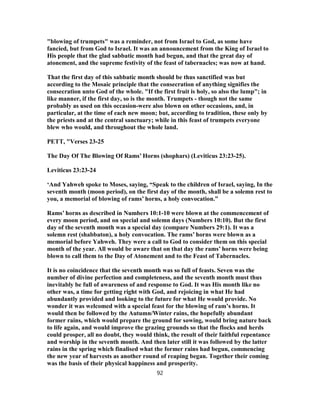
![SIMEON, "THE FEAST OF TRUMPETS
Leviticus 23:23-25. And the Lord spake unto Moses, saying, Speak unto the children
of Israel, saying, In the seventh month, In the first day of the month, shall ye have a
Sabbath, a memorial of blowing of trumpets, an holy convocation. Ye shall do no
servile work therein; but ye shall offer an offering made by fire unto the Lord.
THE ordinances of the Mosaic law, though dark in themselves, are, for the most
part, rendered luminous by the Gospel: their true meaning is opened to us by
inspired expositors; and little room is left for the exercise of fancy or conjecture.
This however is not universally the case: the ordinance before us is a remarkable
exception to the general rule: Moses himself does not inform us on what occasion, or
for what particular end it was appointed: nor do the New-Testament writers give us
any explanation of the subject. But as it was one of the great annual feasts among
the Jews, it must of necessity be instructive. We shall endeavour therefore to search
out the meaning as well as we can; and to shew,
I. For what end this feast was instituted—
Some have referred it to the blowing of the trumpet on Mount Sinai: and others
have supposed that it referred to all the different occasions whereon the trumpet
was blown. But the former of these does not appear a proper foundation for a joyful
feast; (when it made all Israel, not excepting Moses himself, to “tremble and
quake:”) and the latter opinion refutes itself: for if they were used on a variety of
occasions, as the summoning of the people to the tabernacle, the directing of them in
their journeys, the stirring of them up against their enemies, and the proclaiming of
the year of jubilee, it is reasonable to suppose, that the appointment of a feast, called
the feast of trumpets, was for some special and peculiar purpose. Accordingly,
though the purpose is not specified, we may form a good judgment respecting it,
from the peculiar day on which it was to be observed. That which in our text is
called the seventh mouth, had been always deemed the first month of the year; but
when God brought his people out of Egypt, he ordered them, in remembrance of
that event, to reckon their year differently, and to begin it in the spring, instead of
the autumn [Note: Exodus 12:2.]. Still however, in their civil and political matters,
they retained the original mode of reckoning; and, except in their ecclesiastical
concerns, this continued to be the first month in the year. This day then was the first
day in the new year; and the feast of trumpets was to them “a memorial;” a
memorial of mercies received, and of mercies promised:
1. Of mercies received—
[It is possible that the creation of the world, which was supposed to have been in the
autumn, (when so many of the fruits are ripe,) was then particularly
commemorated. But we apprehend that the mercies of the preceding year were then
reviewed; and grateful acknowledgments were made to God for them. This seems to
93](https://image.slidesharecdn.com/leviticus23commentary-161220145537/85/Leviticus-23-commentary-93-320.jpg)
![be a fit employment for the commencement of a new year; and every succeeding
year must of necessity bring with it many renewed occasions for praise and
thanksgiving. Even though the nation should have been visited with judgments, still
those judgments are so disproportioned to men’s ill desert, and are always blended
with so many mercies, that there could not fail of being always abundant reason for
joy and gratitude.
The blowing of the trumpets would awaken the attention of the people to the duties
of the day, and bring to their recollection some at least of those mercies, which they
were now called upon to acknowledge.]
2. Of mercies promised—
[In this sense the term “memorial” is often used in Scripture. The stones on Aaron’s
breast-plate were a “memorial,” to remind the people, that God regarded them as
his peculiar care, and bore them upon his heart [Note: Exodus 28:12; Exodus
28:29.]. The atonement-money, which was to be paid on numbering the people, was
also a “memorial” of the security which was assured to them under God’s protecting
hand [Note: Exodus 30:16.]. The frankincense which from week to week was put
upon the shew-bread [Note: Leviticus 24:7.], was of a similar nature; for whilst it
reminded God of his people and their necessities, it was a pledge to them that he
would supply their wants. Moreover, the Psalmist, expressly referring to this feast,
says, “it was ordained for a testimony [Note: Psalms 81:1-5. Comp. also Numbers
10:9-10.].” Now when this “memorial” sounded in their ears, the various temporal
mercies which they would need, would of course occur to their minds. But there
were spiritual blessings, which probably came but little into the contemplation of
the people, which yet were of principal importance in the sight of God, and were
particularly shadowed forth on this occasion; I mean, the prosperity of Zion, and
the enlargement of the Church of Christ.
That this was intended, an inspired Apostle assures us; for speaking of this very
feast amongst others, he says, “Which things are a shadow of good things; but the
body is of Christ [Note: Colossians 2:16-17.].”
The language used in reference to the Gospel, strongly confirms this truth. It is
emphatically called, “the joyful sound;” and they who preach it are said, to “lift up
their voice as a trumpet:” and when the fulness of time shall come for the universal
establishment of Christ’s kingdom in the world, the sound of this trumpet shall be
heard to the remotest corners of the earth, and all, from the least even to the
greatest, shall come up to his temple. Even “Assyria and Egypt,” the most
determined enemies of God’s people, shall be stirred up by it to “come and worship
in the holy mount in Jerusalem [Note: Isaiah 27:13. Mark this passage.].”
Such a prospect was a solid ground of joy. We rejoice in the partial accomplishment
of this event that has already taken place: and we look forward with joy to its full
and final accomplishment.]
94](https://image.slidesharecdn.com/leviticus23commentary-161220145537/85/Leviticus-23-commentary-94-320.jpg)
![Let us proceed to consider—
II. In what manner it was to be observed—
The three great feasts, the Passover, the feast of Pentecost, and the feast of
tabernacles, were greater than this; because, on them, all the males were required to
assemble at Jerusalem: but next to them was the feast of trumpets. It was more holy
than a common Sabbath; because no servile work at all might be done on this day;
whereas on common Sabbaths an exception was made for preparing their necessary
provision. Moreover on this day they were to be fully occupied in offering sacrifices
to God. Besides the daily sacrifices, and those appointed at the beginning of every
month, there were many peculiar to this occasion: and an express order was made,
that neither the daily nor monthly offerings should be superseded, but that those for
this day should be presented in addition to all the others [Note: Numbers 29:1-6.].
Now from this feast, so peculiarly prefiguring the Gospel, and being observed with
such extraordinary strictness, we may learn,
1. The scope and tendency of the Gospel—
[When it reaches the ears and hearts of men, it calls them from the world to serve
and delight in God, and that without intermission, from the morning to the evening
of their lives. Not that it forbids all servile work; on the contrary, it requires “every
man to abide in the calling wherein he is called,” and to fulfil the duties of his
station with assiduity: but, while it leaves our hands at liberty, it forbids that our
hearts should be enslaved: they must be reserved for God, and fixed on him alone.
The one occupation of our lives must be to offer to him the sacrifices of prayer and
praise [Note: Hebrews 13:15.]: “Rejoice in the Lord always,” says the Apostle, “and
again I say, Rejoice.” Every blast of the trumpet should remind us of the infinite
obligations conferred upon us, and of the assurances which God has given us of final
and everlasting happiness. It is not a deliverance from temporal bondage, or victory
over earthly enemies, that we have to rejoice in, but in deliverance from the wrath of
God, and in victory over sin and Satan, death and hell. All this, too, is given us, not
by a mere exertion of God’s power, but by the death of his Son, and the influences of
his Spirit. Shall not we then rejoice? Again I say, that the Gospel trumpet sounds
these things in our ears continually: and therefore we should keep throughout our
whole lives a feast unto the Lord.]
2. The duty of those who embrace it—
[We have already seen what abstraction from the world. and what devotedness to
God, were required of the Jews on that day. If they then, who had only the shadow
of heavenly things, were to serve God in this manner, how ought we, who enjoy the
substance! Surely we should serve him without grudging, without weariness, and
without distraction. If they grudged their numerous and costly sacrifices, or were
95](https://image.slidesharecdn.com/leviticus23commentary-161220145537/85/Leviticus-23-commentary-95-320.jpg)
![weary of their long and lifeless services, or had their minds diverted from these poor
and “beggarly elements,” we should not wonder at it: their very feasts, though
suited to the ends for which they were appointed, were burthensome in the extreme.
But ours is a spiritual service. True, it may require some sacrifices; but none that
are worthy of a thought, when we consider for whom they are made. As for sin, the
mortifying of that should be deemed no sacrifice at all: it is rather like the removal
of a leprosy, or the healing of a wound. As for time, or interest, there is nothing to be
sacrificed in relation to these, that will not be repaid an hundred-fold even in this
life, and with everlasting life in the world to come. And, if we engage heartily in the
Lord’s service, we shall find, that the more we are employed in it, the more
delightful it will be: it is wearisome only to those who are formal and hypocritical in
their duties. Doubtless “the flesh will often evince its weakness, even when the spirit
is most willing:” but the more we seek to rejoice in God, the more we shall rejoice in
God. Let us be on our guard against those worldly cares or pleasures that are apt to
divert the mind from its proper duties. St. Paul particularly tells us, that “he would
have us without carefulness;” and recommends us so to order our matters, that we
may “attend upon the Lord without distraction [Note: 1 Corinthians 7:35.].” These
things then are our duty: duty, do I say? they are our privilege, our highest
privilege. So David thought, when he said, “Blessed are the people that know the
joyful sound; they shall walk, O Lord, in the light of thy countenance: in thy name
shall they rejoice all the day; and in thy righteousness shall they be exalted [Note:
Psalms 89:15-16.].”]
PULPIT, "Leviticus 23:23-25
In the seventh month, in the first day of the month. Only one of the monthly
festivals is named in this chapter, because it is the only one on which a holy
convocation was to be held. The first day of the seventh month we should expect to
be holier than the first day of any other month, on account of the peculiar holiness
of the seventh month, and because it was the beginning of the civil year. It is to be a
sabbath; that is, a festival observed by rest, and a memorial of blowing of trumpets.
The latter words should be rather rendered a memorial of a joyful noise. That these
joyful sounds were made by blowing the cornet, we may well believe from the
testimony of tradition, but the text of Holy Scripture does not state the fact, and the
use of the word trumpets in place of "cornets" leads to a confusion. Every new
moon, dud among them that of the seventh month, was observed by the blowing of
trumpets (Numbers 10:10), but the trumpets then blown differed in their use and
shape from the cornet. The trumpet was a long-shaped, metal instrument, at first
used to give the signal for marching, afterwards to serve as the sign of the arrival of
the monthly festival; the cornet was an animal's horn, or, if not a real horn, an
instrument formed in the shape of a horn, and it was used to express joyful
emotions, answering somewhat to our modern bell-ringing in the West, or firing
unloaded guns in the East. Besides the blowing of trumpets, special sacrifices were
appointed for the first of each month, "two young bullocks, and one ram, seven
lambs," with their meat and drink offerings, for a burnt offering, and "one kid of
the goats" for a sin offering (Numbers 28:11-15). On New Year's Day, which, from
96](https://image.slidesharecdn.com/leviticus23commentary-161220145537/85/Leviticus-23-commentary-96-320.jpg)
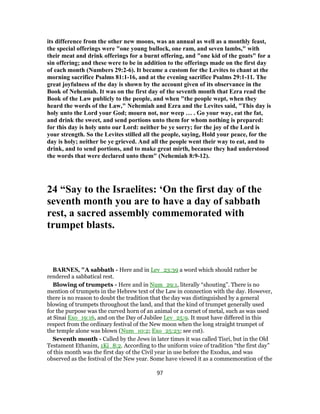
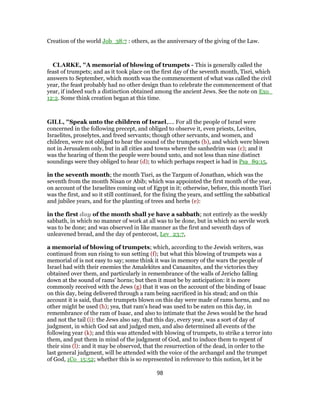
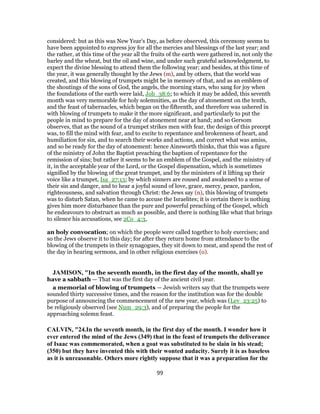

![atonement, which was at hand: and many have justly supposed that this festival was
typical of the blowing of the Gospel trumpet; see Isaiah 58:1. Hosea 8:1. Zechariah
9:14. The Gentiles seem to have borrowed from hence their blowing with trumpets
among the rites and ceremonies in the worship of Cybele.
BENSON, "Leviticus 23:24. A sabbath — Solemnized with the blowing of trumpets
by the priests, not in a common way, as they did every first day of every month, but
in an extraordinary manner, not only in Jerusalem, but in all the cities of Israel.
They began to blow at sunrise, and continued blowing till sunset. This seems to have
been instituted, 1st, To solemnize the beginning of the new year, whereof, as to civil
matters, and particularly as to the jubilee, this was the first day; concerning which it
was fit the people should be admonished, both to excite their thankfulness for God’s
blessings in the last year, and to direct them in the management of their civil affairs.
2d, To put a special honour upon this month. For, as the seventh day was the
sabbath, and the seventh year was a sabbatical year, so God would have the seventh
month to be a kind of sabbatical month, on account of the many sabbaths and
solemn feasts which were observed in this, more than in any other month. And by
this sounding of the trumpets in its beginning, God would quicken and prepare
them for the following sabbaths, as well that of atonement, and humiliation for their
sins, as those of thanksgiving for God’s mercies.
ELLICOTT, "(24) A memorial of blowing of trumpets.—Literally, remembrance
blowing, for which see Numbers 29:1, the only place in the Old Testament where
this festival is named as “the day of blessing,” i.e., the trumpets. As the first of
Ethanim, as the month is called in the Bible (1 Kings 8:2), or Tishri, as the Jews call
it, in which this festival occurs, is the commencement of the civil new year, this
festival was called “the Festival of New Year” ever since the time of the second
Temple, and has been regarded as preparatory to the great day of Atonement,
which is ten days later. The blowing of trumpets, therefore, which was the
distinguishing feature of this festival, was designed to summon the Israelites to enter
upon the work of sanctification, which will be accounted to them as a merit in the
sight of God, and for which they are promised to be especially remembered before
the Lord (Numbers 10:9-10). Hence its name, Remembrance blowing—the blowing
of trumpets, which will make them to be remembered before the Lord. The
synagogue, however, takes the name more in the sense of “reminding” God of the
merits of the patriarchs and his covenant with them, and for this reason has
appointed Genesis 21:1-34; Genesis 22:1-24, recording the birth and sacrifice of
Isaac, as the lesson for this festival.
TRAPP, "Verse 24
Leviticus 23:24 Speak unto the children of Israel, saying, In the seventh month, in
the first [day] of the month, shall ye have a sabbath, a memorial of blowing of
trumpets, an holy convocation.
101](https://image.slidesharecdn.com/leviticus23commentary-161220145537/85/Leviticus-23-commentary-101-320.jpg)
![Ver. 24. Of blowing of trumpets.] This feast signified the spiritual joy and gladness
of the saints that are redeemed by Christ, all their life long. [Isaiah 23:10]
25 Do no regular work, but present a food
offering to the Lord.’”
GILL, "Ye shall do no servile work therein,.... Only such as was necessary for
dressing food, but not any manual work, such as servants were employed in on other
days, as agriculture or any mechanic business:
but ye shall offer an offering made by fire unto the Lord; a burnt offering, and
what that was may be seen in Num_29:1.
ELLICOTT, "Verse 25
(25) Ye shall do no servile work.—With the exception of what was absolutely
necessary, all handicraft and trade were stopped. (See Leviticus 23:7.)
But ye shall offer.—As the festival is also the new moon, a threefold sacrifice was
offered on it, (1) viz. the ordinary daily sacrifice which was offered first; (2) the
appointed new moon sacrifice (Numbers 28:11-15); and (3) the sacrifice for this
festival, which consisted of a young bullock, a ram, and seven lambs of the first year,
with the usual meat offerings, and a kid for a sin offering (Numbers 29:1-6). With
the exception, therefore, of there being one bullock instead of two, this sacrifice was
simply a repetition of the monthly offering by which it was preceded in the service.
During the offering of the drink offering and the burnt offering the Levites engaged
in vocal and instrumental music, singing the eighty-first and other psalms, whilst
the priests at stated intervals broke forth with awful blasts of the trumpets. After
the offering up of the sacrifices, the service was concluded by the priests, who
pronounced the benediction (Numbers 6:23-27), which the people received in a
prostrate position before the Lord. Having prostrated themselves a second time in
the court, the congregation resorted to the adjoining synagogue, where the
appointed lessons from the Law and the Prophets were read, consisting of Genesis
21:1-34; Numbers 29:1-6; 1 Samuel 1:1 to 1 Samuel 2:10; Genesis 22:1-24; Jeremiah
31:2-20. Psalms were recited and the festival prayers were offered, beseeching the
Lord to pardon the sins of the past year, and to grant the people a happy new year.
This concluded the morning service, after which the families resorted to their
respective homes, partook of the social and joyous repast, and in the evening went
again into the Temple to witness the offering of the evening sacrifices, and to see the
102](https://image.slidesharecdn.com/leviticus23commentary-161220145537/85/Leviticus-23-commentary-102-320.jpg)


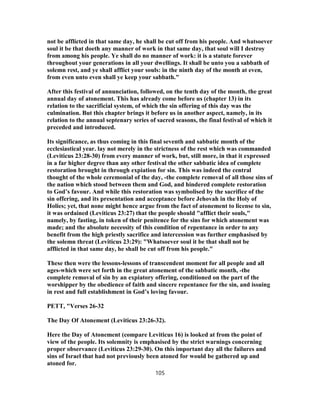
![Leviticus 23:26-27
‘And Yahweh spoke to Moses, saying, “Howbeit on the tenth day of this seventh
month is the day of atonement. It shall be a holy convocation to you, and you shall
afflict (humble) yourselves; and you shall offer an offering made by fire to Yahweh”
The tenth day of the seventh month is to be the Day of Atonement. It is to be a holy
‘calling-together’, a day on which they ‘afflict themselves’ and a day when an
offering is made by fire to Yahweh. For full details of the latter see chapter 16.
“Afflict (humble) themselves.” That is, deal hardly with themselves (compare
Genesis 16:6; Genesis 31:50), or submit themselves humbly (compare Genesis 16:9;
Exodus 10:3). No indication is given of exactly what this means. It may refer to
fasting, to self-examination and family-group-examination, or to other forms of
consideration of sins and of repentance, or to a general humbling before God. The
main point is presumably a demonstration to God of a genuine desire to put away
sin. Compare Isaiah 58:5 where ‘afflicting themselves’ appears to refer to ‘bowing
down the head as a bulrush’, and ‘spreading sackcloth and ashes’, presumably to
kneel on as a sign of repentance.
PULPIT, "Leviticus 23:26-32
The ceremonies to be observed on the day of atonement have been already described
in Leviticus 16:1-34, where it found its place as the great purification of the people
and of the sanctuary. Here it is reintroduced as one of the holy days. It is the one
Jewish fast; to be observed as a day of holy convocation, a day in which to afflict
your souls and to offer an offering made by fire unto the Lord, and in which no
manner of work was to be done; inasmuch as, like the weekly sabbath, it was a
sabbath of rest from the ninth day of the month at even, from even unto even. The
time of year at which it was appointed shows that one purpose of its institution was
to make solemn preparation for the joyous festival of Tabernacles, which was to
follow in five days' time, when the people ought to be in a state of reconciliation with
God.
27 “The tenth day of this seventh month is the
Day of Atonement. Hold a sacred assembly and
deny yourselves,[d] and present a food offering to
the Lord.
106](https://image.slidesharecdn.com/leviticus23commentary-161220145537/85/Leviticus-23-commentary-106-320.jpg)

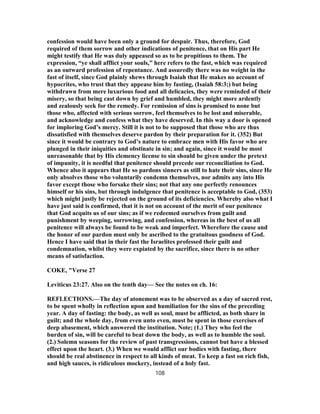
![BENSON, "Leviticus 23:27. Afflict your souls — With fasting and bitter repentance
for all, and especially their national sins, among which, no doubt, God would have
them remember their sin of the golden calf. For as God had threatened to remember
it in after-times to punish them for it, so there was great reason why they should
remember it to humble themselves for it.
ELLICOTT, " (27) Also on the tenth.—See Leviticus 16:29.
And ye shall afflict your souls.—That is, fast. (See Leviticus 16:29.)
And offer an offering.—See Numbers 29:8-11.
TRAPP, "Leviticus 23:27 Also on the tenth [day] of this seventh month [there shall
be] a day of atonement: it shall be an holy convocation unto you; and ye shall afflict
your souls, and offer an offering made by fire unto the LORD.
Ver. 27. Also on the tenth day.] {See Trapp on "Leviticus 16:31"} Thus they were
kept in sorrow five days, before they might keep their feast of joy. [Leviticus 23:34]
28 Do not do any work on that day, because it is
the Day of Atonement, when atonement is made
for you before the Lord your God.
CLARKE, "A day of atonement - See the note on Lev_16:2, etc., where this
subject is largely explained.
GILL, "Ye shall do no work in that same day,.... No more than on the weekly
sabbath:
for it is a day of atonement, to make atonement for you before the Lord your
God: See Gill on Lev_16:30; Aben Ezra's note is,"for you only,''that is, for the Israelites,
and not the Gentiles; but the atonement of Christ, the antitype of this, was not for the
sins of the Jews only, but for the sins of the whole world, of all his people in it, 1Jo_2:2.
109](https://image.slidesharecdn.com/leviticus23commentary-161220145537/85/Leviticus-23-commentary-109-320.jpg)






![many days before the feast of tabernacles as to enjoy the opportunity of attending on the
day of atonement. Now, [1.] The afflicting of their souls on the day of atonement
prepared them for the joy of the feast of tabernacles. The more we are grieved and
humbled for sin, the better qualified we are for the comforts of the Holy Ghost. [2.] The
joy of this feast recompensed them for the sorrow of that fast; for those that sow in tears
shall reap in joy. (2.) It was to continue eight days, the first and last of which were to be
observed as sabbaths, days of holy rest and holy convocations, Lev_23:35, Lev_23:36,
Lev_23:39. The sacrifices to be offered on these eight days we have a very large
appointment of, Num_29:12, etc. (3.) During the first seven days of this feast all the
people were to leave their houses, and the women and children in them, and to dwell in
booths made of the boughs of thick trees, particularly palm trees, Lev_23:40, Lev_
23:42. The Jews make the taking of the branches to be a distinct ceremony from the
making of the booths. It is said, indeed (Neh_8:15), that they made their booths of the
branches of trees, which they might do, and yet use that further expression of joy, the
carrying of palm-branches in their hands, which appears to have been a token of
triumph upon other occasions (Joh_12:13), and is alluded to, Rev_7:9. The eighth day
some make a distinct feast of itself, but it is called (Joh_7:37) that great day of the feast;
it was the day on which they returned from their booths, to settle again in their own
houses. (4.) They were to rejoice before the Lord God during all the time of this feast,
Lev_23:40. The tradition of the Jews is that they were to express their joy by dancing,
and singing hymns of praise to God, with musical instruments: and not the common
people only, but the wise men of Israel, and their elders, were to do it in the court of the
sanctuary: for (say they) the joy with which a man rejoices in doing a commandment is
really a great service.
K&D 33-37, "On the fifteenth of the same month the feast of Tabernacles was to be
kept to the Lord for seven days: on the first day with a holy meeting and rest from all
laborious work, and for seven days with sacrifices, as appointed for every day in Num
29:13-33. Moreover, on the eighth day, i.e., the 22nd of the month, the closing feast was
to be observed in the same manner as on the first day (Lev_23:34-36). The name, “feast
of Tabernacles” (booths), is to be explained from the fact, that the Israelites were to
dwell in booths made of boughs for the seven days that this festival lasted (Lev_23:42).
ת ֶרֲֶצע, which is used in Lev_23:36 and Num_29:35 for the eighth day, which terminated
the feast of Tabernacles, and in Deu_16:8 for the seventh day of the feast of Mazzoth,
signifies the solemn close of a feast of several days, clausula festi, from רַצָע to shut in, or
close (Gen_16:2; Deu_11:17, etc.), not a coagendo, congregando populo ad festum, nor
a cohibitione laboris, ab interdicto opere, because the word is only applied to the last
day of the feasts of Mazzoth and Tabernacles, and not to the first, although this was also
kept with a national assembly and suspension of work. But as these clausaulae festi were
holidays with a holy convocation and suspension of work, it was very natural that the
word should be transferred at a later period to feasts generally, on which the people
suspended work and met for worship and edification (Joe_1:14; Isa_1:13; 2Ki_10:20).
The azareth, as the eighth day, did not strictly belong to the feast of Tabernacles, which
was only to last seven days; and it was distinguished, moreover, from these seven days
by a smaller number of offerings (Num_29:35.). The eighth day was rather the solemn
close of the whole circle of yearly feasts, and therefore was appended to the close of the
last of these feasts as the eighth day of the feast itself (see at Num 28 seq.). - With Lev_
23:36 the enumeration of all the yearly feasts on which holy meetings were to be
116](https://image.slidesharecdn.com/leviticus23commentary-161220145537/85/Leviticus-23-commentary-116-320.jpg)
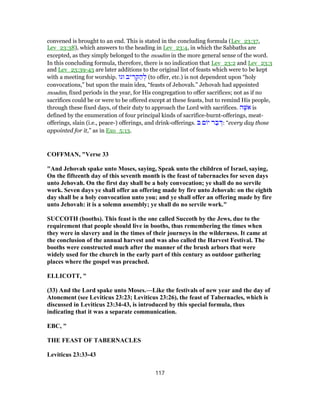
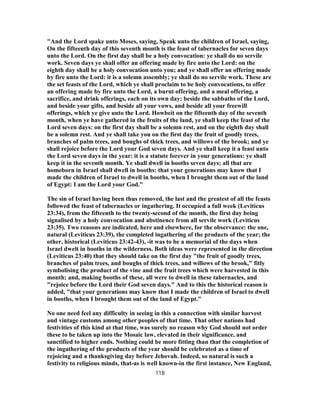

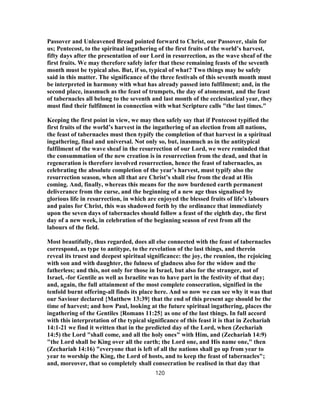


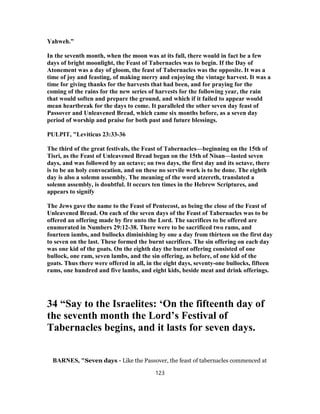
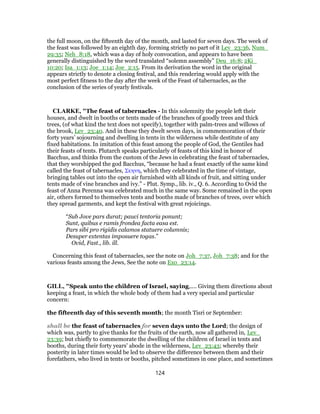

![annual festivals, and, like the other two, it lasted a week. It began on the fifteenth day of
the month, corresponding to the end of our September and beginning of October, which
was observed as a Sabbath; and it could be celebrated only at the place of the sanctuary,
offerings being made on the altar every day of its continuance. The Jews were
commanded during the whole period of the festival to dwell in booths, which were
erected on the flat roofs of houses, in the streets or fields; and the trees made use of are
by some stated to be the citron, the palm, the myrtle, and the willow, while others
maintain the people were allowed to take any trees they could obtain that were
distinguished for verdure and fragrance. While the solid branches were reserved for the
construction of the booths, the lighter branches were carried by men, who marched in
triumphal procession, singing psalms and crying “Hosanna!” which signifies, “Save, we
beseech thee!” (Psa_118:15, Psa_118:25, Psa_118:26). It was a season of great rejoicing.
But the ceremony of drawing water from the pool, which was done on the last day, seems
to have been the introduction of a later period (Joh_7:37). That last day was the eighth,
and, on account of the scene at Siloam, was called “the great day of the feast.” The feast
of ingathering, when the vintage was over, was celebrated also on that day [Exo_23:16;
Exo_34:22], and, as the conclusion of one of the great festivals, it was kept as a sabbath.
CALVIN, "34.The fifteenth day of this seventh month. It is shewn in the end of the
chapter why God instituted the Feast of Tabernacles, viz, that the children of Israel
might remember that they dwelt in tents in the desert, when they had no certain
dwelling-place,but, as it were, passed a wandering life. The Passover shewed how
they were marvellously rescued from immediate death by the hand of God; but by
this other day God magnified the continuous and daily flow of His grace; for it
would not have been enough to acknowledge His power in their actual departure,
and to give Him thanks for their momentary deliverance, unless they reflected
altogether on the progress of their perfect deliverance, which they had experienced
during forty years. In allusion to this the Prophet Zechariah, when he is speaking of
the second redemption, enjoins upon all the nations which should be converted to
God’s worship, that they should go up every year to celebrate this day. (Zechariah
14:16.) And why this rather than the other festivals? because their return from
Babylon by a long and difficult journey, endangered by the violent assaults of
enemies, would be equally memorable with the passage of the people from Egypt
into the Promised Land. Hence we gather that, though the ceremony is now
abolished, yet its use still exists in spirit and in truth, in order that the incomparable
power and mercy of God should be constantly kept before our eyes, when He has
delivered us from darkness and from the deep abyss of death, and has translated us
into the heavenly life. But it behooved that the ancient people in their ignorance
should be thus exercised, that all from youth to old age, going forth from their
homes, should be brought, as it were, into the actual circumstances, and in that
spectacle should perceive what would have else never sufficiently penetrated their
minds; whilst at the same time they were instructed for the time to come, that even
in the land of Canaan they were to be sojourners, since this is the condition
prescribed to all the pious, and children of God, that they should be strangers on
earth, if they desire to be inheritors of heaven. Especially, however, God would stir
them up to gratitude, that they might more highly estimate their quiet occupation of
126](https://image.slidesharecdn.com/leviticus23commentary-161220145537/85/Leviticus-23-commentary-126-320.jpg)
![the Promised Land, and the comfort of their houses, when they recollected that they
were brought hither by His hand out of the desert, and from the most wretched
destitution of all things.
COKE, "Leviticus 23:34. Speak unto the children of Israel, saying, The fifteenth
day, &c.— The next solemn meeting was called the feast of tabernacles, upon which
they dwelt for seven days in booths or tabernacles, to commemorate their having
dwelt for forty years in tabernacles in the wilderness, Leviticus 23:42-43. This was
one reason of the institution: another is given in the 39th verse; and the typical view
respects his birth and dwelling in the tabernacle of human flesh, who, in the fulness
of time, was born, as it is commonly supposed, at the time of this festival; see John
1:14.
ELLICOTT, " (34) The fifteenth day of this seventh month.—That is, the month
Tishri, corresponding to the end of September and the beginning of October, and
only four days after the day of Atonement.
Shall be the feast of tabernacles.—How and where these tabernacles are to be
erected the law here gives no directions. The details, as in many other enactments,
are left to the administrators of the Law. From the account of the first celebration of
this festival after the return from Babylon, the Jews, according to the command of
Ezra, made themselves booths upon the roofs of houses, in the courts of their
dwellings, and of their sanctuary, in the streets of the Water-gate and the gate of
Ephraim. These tabernacles they made of olive branches, pine branches, myrtle
branches, palm branches, and branches of thick trees (Nehemiah 8:15-18). The
construction of these temporary abodes, however, was more minutely defined by
Ezra’s successors. It was ordained during the second Temple that the interior of
each tabernacle must not be higher than twenty cubits, and not lower than ten
palms, it must at least have three walls, with a thatched roof partially open so as to
admit a view of the sky and the stars. It must not be under a tree, nor must it be
covered with a cloth, or with any material which contracts defilement. Only
branches or shrubs which grow out of the ground are to be used for the covering.
These booths the Israelites began to erect on the morrow after the Day of
Atonement. On the fourteenth, which was the day of preparation, the pilgrims came
up to Jerusalem, and on the eve of this day the priests proclaimed the approach of
the holy convocation by the blasts of trumpets. As on the feasts of Passover and
Pentecost, the altar of burnt-offering was cleansed in the first night watch, and the
gates of the Temple, as well as those of the inner court, were opened immediately
after midnight, for the convenience of the priests who resided in the city, and for the
people, who filled the court before the cock crew, to have their sacrifices duly
examined by the priests.
TRAPP, "Leviticus 23:34 Speak unto the children of Israel, saying, The fifteenth
day of this seventh month [shall be] the feast of tabernacles [for] seven days unto the
LORD.
127](https://image.slidesharecdn.com/leviticus23commentary-161220145537/85/Leviticus-23-commentary-127-320.jpg)
![Ver. 34. The feast of tabernacles.] It signified, the prophet Zechariah being
interpreter, [Leviticus 14:16-19] that the remembrance of our redemption by Christ
should be perpetuated with all spiritual gladness.
35 The first day is a sacred assembly; do no
regular work.
GILL, "On the first day shall be an holy convocation,.... When they should be
called together to holy exercises, to prayer, praising, and reading the law; and at this
present time they observe this day, by rising early in the morning and going to the
synagogue, where they sing and pray much; and everyone takes a bundle of branches of
palm tree, olive, &c. in the right hand, and a pome citron in the left, and says, blessed be
thou, O Lord our God, the Lord of the world, who has sanctified us by thy precepts, and
hath commanded us to carry the palm tree bundle; then they shake it, and give a great
shout, according to Psa_96:12; all which they frequently repeat on this day, as well as
bring out the book of the law, attended with various ceremonies, and read some passages
in it (t):
ye shall do no servile work therein; as on the first and seventh days of unleavened
bread, the day of Pentecost, and of the blowing of trumpets; but what was necessary for
preparing and dressing food might be done.
ELLICOTT, " (35) on the first day shall be an holy convocation.—At daybreak of
this day one of the priests, accompanied by a jubilant procession and a band of
music, went with a golden pitcher to the pool of Siloam, and having filled it with
water, returned with it to the Temple in time to join his brother-priests in the
morning sacrifices. He entered from the south through the water-gate, when he was
welcomed by three blasts of the trumpets. He then ascended the steps of the altar
with another priest, who carried a pitcher of wine for the drink offering. The two
priests turned to the left of the altar, where two silver basins were fixed with holes at
the bottom, and simultaneously poured into their respective basins the water and
the wine in such a manner that both were emptied at the same time upon the base of
the altar. This ceremony of drawing the water was repeated every morning during
the seven days of the festival. Another jubilant multitude, who went outside
Jerusalem at the same time to gather willows, now returned. With great rejoicings
and amidst blasts of trumpets they carried the willows into the Temple, and placed
them at the altar in such a manner that their tops overhung and formed a kind of
canopy.
128](https://image.slidesharecdn.com/leviticus23commentary-161220145537/85/Leviticus-23-commentary-128-320.jpg)
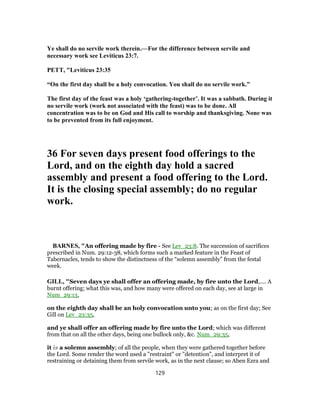



![to offer an offering made by fire unto the Lord; which is explained by
HENRY 37-38, " It was a typical feast. It is supposed by many that our blessed
Saviour was born much about the time of this feast; then he left his mansions of light
above to tabernacle among us (Joh_1:14), and he dwelt in booths. And the worship of
God under the New Testament is prophesied of under the notion of keeping the feast of
tabernacles, Zec_14:16. For, [1.] The gospel of Christ teaches us to dwell in tabernacles,
to sit loose to this world, as those that have here no continuing city, but by faith, and
hope and holy contempt of present things, to go out to Christ without the camp, Heb_
13:13, Heb_13:14. [2.] It teaches us to rejoice before the Lord our God. Those are the
circumcision, Israelites indeed, that always rejoice in Christ Jesus, Phi_3:3. And the
more we are taken off from this world the less liable we are to the interruption of our
joys.
II. The summary and conclusion of these institutions.
1. God appointed these feasts (Lev_23:37, Lev_23:38), besides the sabbaths and your
free-will offerings. This teaches us, (1.) That calls to extraordinary services will not
excuse us from our constant stated performances. Within the days of the feast of
tabernacles there must fall at least one sabbath, which must be as strictly observed as
any other. (2.) That God's institutions leave room for free-will offerings. Not that we may
invent what he never instituted, but we may repeat what he has instituted, ordinarily,
the oftener the better. God is well pleased with a willing people.
COFFMAN, "Verse 37
"These are the set feasts of Jehovah, which ye shall proclaim to be holy
convocations, to offer an offering made by fire unto Jehovah, a burnt-offering, and
a meal-offering, a sacrifice, and drink-offerings, each on its own day; besides the
sabbaths of Jehovah, and besides your gifts, and besides all your vows, and besides
all your freewill-offerings, which ye give unto Jehovah."
This passage mentions a number of offerings without giving specific instructions for
the manner of their offering, except for the order that they should be offered on the
appropriate days. Since these instructions were for the people generally, it was not
necessary to detail all of the rules which the priests would follow in carrying out
these instructions. Moses would cover these in Numbers 28ff.
ELLICOTT, "Verse 37
(37) These are the feasts of the Lord.—That is, the above-named six festivals, viz.—
(1) the Passover (Leviticus 23:4-14), (2) Pentecost Leviticus 23:15-22), (3) New Year
(Leviticus 23:23-25), (4) Day of Atonement (Leviticus 23:26-32), (5) Tabernacles
(Leviticus 23:33-36 a), and (6) the concluding festival (Leviticus 23:36 b). Thus the
list of these festivals concludes with the formula by which they were introduced in
Leviticus 23:4.
133](https://image.slidesharecdn.com/leviticus23commentary-161220145537/85/Leviticus-23-commentary-133-320.jpg)
![To offer an offering.—On these festivals sacrifices are to be offered as prescribed in
Numbers 28, 29.
PETT, "Verse 37-38
A Summary (Leviticus 23:37-38).
Leviticus 23:37
“These are the set feasts of Yahweh, which you shall proclaim to be holy
convocations, to offer an offering made by fire to Yahweh, a whole burnt offering,
and a grain offering, a sacrifice, and drink-offerings, each on its own day;
These then were the set feasts of Yahweh which were to be proclaimed as holy
‘getting-togethers’ for the offering of offerings made by fire to Yahweh, including
whole burnt offerings, grain offerings, sacrifices and drink-offerings each on its own
day. The ‘sacrifices’ were presumably the purification for sin offerings of the he-
goats.
Leviticus 23:38
“Besides the sabbaths of Yahweh, and besides your gifts, and besides all your vows,
and besides all your freewill-offerings, which you give to Yahweh.”
And this time and these offerings were offered to Yahweh on top of the regular
Sabbaths, and their own freewill gifts, and all their vows, and all their freewill
offerings which would provide the basis of the feasting. All these too would be given
to Yahweh.
PULPIT, "Leviticus 23:37, Leviticus 23:38
These verses form the conclusion of the immediate subject. The feasts have been
enumerated in which holy convocations are to be held and public sacrifices offered;
these sacrifices, it is explained, not including those of the sabbath or of individual
offerers.
38 These offerings are in addition to those for the
Lord’s Sabbaths and[e] in addition to your gifts
and whatever you have vowed and all the freewill
134](https://image.slidesharecdn.com/leviticus23commentary-161220145537/85/Leviticus-23-commentary-134-320.jpg)

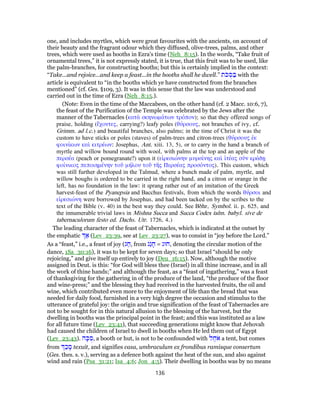

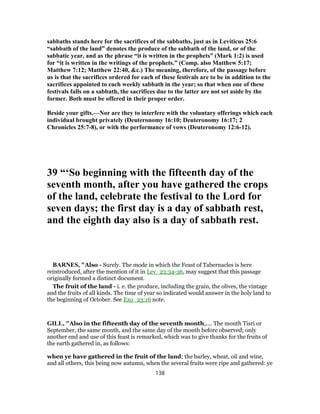
![shall keep a feast unto the Lord seven days; not different from that before mentioned,
but the same, one design of which is here suggested, to give thanks for the fruits of the
earth: hence this feast is sometimes called the feast of ingathering, Exo_23:16; as
another use of it is after mentioned, to commemorate the children of Israel dwelling in
booths in the wilderness:
on the first day shall be a sabbath, and on the eighth day shall be a sabbath;
because on both there was a cessation from servile work, Lev_23:35.
COFFMAN, "Verse 39
"Howbeit, on the fifteenth day of the seventh month, when ye have gathered in the
fruits of the land, ye shall keep the feast of Jehovah seven days: on the first day shall
be a solemn rest, and on the eighth day shall be a solemn rest. And ye shall take you
on the first day the fruit of goodly trees, branches of palm trees, and boughs of thick
trees, and willows of the brook; and ye shall rejoice before Jehovah your God seven
days. And ye shall keep it a feast unto Jehovah seven days in the year: it is a statute
forever throughout your generations; ye shall keep it in the seventh month. Ye shall
dwell in booths seven days; all that are home-born in Israel shall dwell in booths;
that your generation may know that I made the children of Israel to dwell in booths,
when I brought them out of the land of Egypt: I am Jehovah your God. And Moses
declared unto the children of Israel the set feasts of Jehovah."
These instructions pertain to the Feast of Tabernacles (booths). The mention of the
"fruit of goodly trees" (Leviticus 23:40) does not have the usual meaning of "fruit,"
but is a reference to the appropriate branches to be used for constructing the
booths. The mention of the willow tree, for example, proves this, because it was not
a FRUIT tree at all. The palm, the willow, and other types of trees would have
provided what was needed.
"When ye have gathered in the fruits of the land ..." This specific mention of the
harvest is significant.
If Pentecost typified the first-fruits of the world's harvest in the ingathering of an
election from all nations (Jews and Gentiles), the completion of that Harvest in the
great spiritual ingathering final and universal must be typified by the Feast of
Tabernacles.[27]
The harvest metaphor so often utilized by Jesus Christ justifies such an analogy. We
shall conclude this chapter with a prophetic picture of the Final Judgment of
mankind set forth in the terminology of the harvest metaphor:
"And another angel came out from the temple, crying with a great voice to him
that sat on the cloud, Send forth thy sickle, and reap: for the hour to reap is come;
for the harvest of the earth is ripe." (Revelation 14:15,16)
139](https://image.slidesharecdn.com/leviticus23commentary-161220145537/85/Leviticus-23-commentary-139-320.jpg)

![the Lord your God seven days. And ye shall keep it a feast unto the Lord seven days
in the year: it shall be a statute for ever in your generations; ye shall celebrate it in
the seventh month. Ye shall dwell in booths seven days; all that are Israelites born
shall dwell in booths; that your generations may know, that I made the children of
Israel to dwell in booths, when I brought them out of the land of Egypt: I am the
Lord your God.
CHRISTIANS in general are deterred from the study of the ceremonial law, by the
consideration that there is not sufficient light thrown upon some parts to determine
their spiritual import, whilst in other parts we are distracted through the diversity
of senses which the New Testament appears to affix to them. Certainly these are
difficulties in our way; nor can we expect entirely to overcome them: but still there
is much that is clear; and even that which is in some respects dubious, will be found
in other respects highly edifying.
The feast of tabernacles was one of the three great feasts, at which all the males
throughout the nation were to assemble at Jerusalem. Its importance therefore
cannot be doubted. But, in our inquiries after the truths which it shadowed forth,
we must be guided in some measure by conjecture; and consequently, cannot speak
with that full confidence that we maintain where the inspired writers have led the
way. Taking care however to distinguish what is doubtful from what is clear and
certain, we shall proceed to consider this feast, and to open to you,
I. Its peculiar rites—
Whilst it had some rites common to other occasions, it had some peculiar to itself:
1. The sacrifices offered—
[These were very peculiar, and such as were offered on no other occasion. The feast
lasted eight days: on the first of which, thirteen bullocks, with two rams, fourteen
lambs, and one kid, and certain meat-offerings, were presented; and, on the six
following days, there were the same sacrifices, except that the number of the
bullocks, and of their appropriate meat-offerings, was one less every day: this went
on to the eighth day, when there was only one bullock, one ram, seven lambs, and a
goat, offered [Note: Numbers 29:12-39.]. The precise reason of this gradual
diminution is not known, unless that it was to shew, that the Mosaic dispensation
would gradually decay, and at last vanish away, being terminated by that one great
Sacrifice which should in due time be offered.]
2. The services enjoined—
[All were to leave their houses for seven days, and to live in booths constructed of
the branches of trees, which they had previously cut down for that purpose. This
would doubtless be attended with much inconvenience to them: but they were to rise
superior to such consideration, and to spend the time in holy joy. Part of the
141](https://image.slidesharecdn.com/leviticus23commentary-161220145537/85/Leviticus-23-commentary-141-320.jpg)
![command was, that they should “rejoice before the Lord their God.” After the time
of Joshua, when the piety of the nation had begun to decline, the observance of this
ordinance was discontinued; or if it was now and then repeated for a single year, the
institution was regarded only in a partial and formal way; till Nehemiah, after the
return of the people from Babylon, revived and enforced the practice of former days
[Note: Nehemiah 8:13-17.].]
The next thing to be noticed in reference to this feast, is,
II. Its primary end—
This was two-fold:
1. Commemorative—
[All the time that the people sojourned in the wilderness, even forty years, they
dwelt in booths or tents; in remembrance of which this feast was instituted [Note:
3.]. We are apt to forget the mercies which God has vouchsafed to us, and especially
those vouchsafed to our forefathers at a remote period. But we ourselves inherit the
benefits conferred on them: the descendants of those who were delivered from
Egypt, owed all their liberty to God’s miraculous interposition, no less than their
fathers; and therefore were equally bound to keep God’s goodness to them in
remembrance: and by leaving their houses for a week, and living in booths, they
would know precisely the situation of their ancestors, and learn to be thankful for
their own more comfortable habitations.]
2. Eucharistic—
[This feast was after the harvest and vintage were finished; and it was intended to
be a season of thanksgiving for the fruits of the earth. Hence it was called “the feast
of in-gathering [Note: Exodus 23:16; Deuteronomy 16:13-15.] ;” which shews, that
the time of keeping the feast was illustrative of one thing, and the manner, of
another. Not but that there was a close connexion between the two; for in the
wilderness they had nothing but manna; but, in the land of Canaan, they enjoyed all
the fruits of the earth in the richest abundance: and, consequently, whilst they
glorified God for miraculously supplying the daily wants of their ancestors by food
from heaven, they were called upon to bless and adore his name for the continued
blessings imparted to themselves.]
Thus far the intention of the feast is manifest. Our ground is not so clear in what
remains: yet we utterly disclaim all idea of giving loose to our imagination on sacred
subjects: we propose to you what, though we cannot prove, we think highly
probable; and leave you to judge for yourselves, whilst we point out,
III. Its mystical design—
142](https://image.slidesharecdn.com/leviticus23commentary-161220145537/85/Leviticus-23-commentary-142-320.jpg)
![That this was a shadow, we have no doubt: and that Christ is the substance, is
equally clear and certain: this point is determined by God himself in reference to the
feasts and Sabbaths in general [Note: Colossians 2:16-17.], and therefore much more
in relation to this, which was as sacred a feast as any, perhaps the most so of any, in
the whole year. We apprehend then that this feast was intended to shadow forth,
1. The incarnation of Christ—
[The three great feasts were, the Passover, or feast of unleavened bread, the feast of
Pentecost, and the feast of tabernacles. In the first, the death of Christ was typified:
in the second, the out-pouring of the Spirit: and in this last, the incarnation of
Christ. It was highly probable that this great event would be shadowed forth by
some feast, as well as the other two: and there is good reason to think it was referred
to in the feast before us. The very term used by the Evangelist in declaring the
incarnation of our Lord, seems to mark this reference [Note: John 1:14 ἐσκήνωσεν.
And though custom has led us to regard December as the time of his birth, the
arguments to prove that he was born in the autumn are far more probable. Could
this point be perfectly ascertained, it would strongly confirm the supposed reference
of this feast to that event.]: and the conduct of the people, when they were
persuaded that he was the Christ, corresponds very much with the rights prescribed
at this feast: “They cut down branches from the trees, and strawed them in the way,
and cried, Hosanna to the Son of David! Blessed is he that cometh in the name of the
Lord; Hosannah in the highest [Note: Matthew 21:8-9.] !” It is true, this was at
another feast: but still it marks the connexion in their minds between the feast of
tabernacles, and the advent of the Messiah. There was a remarkable circumstance
which took place at the feast of tabernacles, which throws some additional light on
this subject. The eighth day was “the great day of the feast.” And though the
dwelling in booths was discontinued, the people observed the season as a feast unto
the Lord. They had indeed substituted a rite or ceremony on that day, bringing
water from the pool of Siloam, and pouring it out as a libation to the Lord. The idea
was perhaps adopted from that expression of the prophet, “With joy shall ye draw
water out of the wells of salvation [Note: Isaiah 12:3.].” On this day, in the place of
public concourse, our Lord stood and cried with a loud voice, “If any man thirst, let
him come unto ME and drink [Note: John 7:2; John 7:37-38.].” This was in fact, as
if he had said, You expect at this time the advent of your Messiah, from whom you
will derive all spiritual blessings: behold, I am he: and, if you will come unto me,
you shall receive more than tongue can utter, or imagination conceive.
We say not that these things amount to a proof of the point in question: but we
suggest them for your consideration, and leave you to form your own judgment
upon them.]
2. The duty of his people—
[Here we can speak with more decision. No one who knows the figurative nature of
the Jewish ritual can doubt, but that this feast was designed to teach us, that “we
143](https://image.slidesharecdn.com/leviticus23commentary-161220145537/85/Leviticus-23-commentary-143-320.jpg)
![are strangers here, and sojourners, as all our fathers were [Note: Psalms 39:12.].”
When fixed in our habitations and enjoying every comfort of life, we are apt to
think that this is our home: the language of our hearts is, “Soul, take thine ease; eat,
drink, and be merry.” But “this is not our rest.” We are here only in a wilderness;
and we must in the spirit of our minds resemble the patriarchs of old, “who, though
in the land of promise, dwelt in tabernacles, declaring that here they had no
continuing city, but that they sought another country, that is, an heavenly [Note:
Hebrews 11:9; Hebrews 11:13-14; Hebrews 11:16.].” This is to be the character of
all the Lord’s people [Note: 1 Peter 2:11.], who, “though in the world, are not of the
world,” and who “are looking for a city that hath foundations, whose builder and
maker is God”— — —]
Application—
[It may be asked, What is all this to us? I answer, Read what the prophet says, and
you will have more satisfactory information than you are aware of [Note: Zechariah
14:16-19.]. Beyond all doubt he is speaking of those who live under the Gospel: and
the repeated injunctions which he gives relative to our observance of this feast, are a
strong confirmation, that there was in it a mysterious and most important meaning.
I call upon you then to keep this feast, to keep it with holy joy unto the Lord. Think
of the incarnation of our blessed Lord! What a stupendous mystery! God, even the
most high God, leaving his blest abodes, and sojourning here in a tabernacle of clay!
Is not this worthy to be commemorated? Does it not demand our most ardent
praise? — — — Think of the harvest of blessings which we obtain through him!
Our corn and wine and oil are but shadows of that heavenly food which is prepared
for us, and on which, if it be not our own fault, we are feeding from day to day. Let
earthly things then not engross your affections, but lead you to seek those which are
spiritual and eternal [Note: Colossians 3:2.] — — — And whether your temporal
comforts be increased or diminished, ever remember where your home is; and that
when your week is finished, “you have an house not made with hands, eternal in the
heavens [Note: 2 Corinthians 5:1.] ” — — —] [Note: If this subject were taken on a
Christmas-day, or for a Harrest Sermon, the more appropriate idea must be most
expanded.]
PULPIT, "Leviticus 23:39-44
A further instruction respecting the Feast of Tabernacles is appended. When ye
have gathered in the fruit of the land, not necessarily at the completion of the
ingathering, but at the time at which the festival is held, ye shall take you on the first
day the boughs of goodly trees. The word in the Hebrew, in its literal acceptation,
means fruits of goodly trees, and hence in later times a misunderstanding arose (see
2 Macc. 10:6, 7), which led to the graceful practice of carrying in the left hand
citrons (the fruit of goodly trees), and in the right hand myrtles, palms, and willows.
It appears, however, that the word signifies in this place rather products than fruits,
namely, leaves and branches. The command, therefore, would be, ye shall take you
… products of goodly trees, branches of palm trees, and the boughs of thick trees,
144](https://image.slidesharecdn.com/leviticus23commentary-161220145537/85/Leviticus-23-commentary-144-320.jpg)


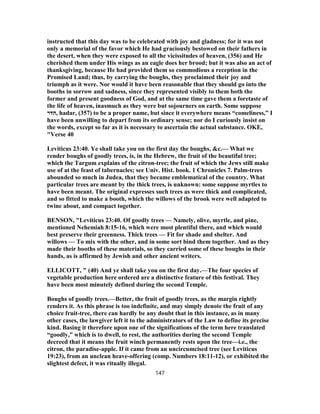




![TRAPP, "Leviticus 23:42 Ye shall dwell in booths seven days; all that are Israelites
born shall dwell in booths:
Ver. 42. Ye shall dwell in booths.] The siege of Jerusalem by the Romans lasted six
months. It began at the passover, and ended at this feast of tabernacles. Ita festum
illud fuit finis istius politiae.
43 so your descendants will know that I had the
Israelites live in temporary shelters when I
brought them out of Egypt. I am the Lord your
God.’”
CLARKE, "That your generations may know, etc. - By the institution of this
feast God had two great objects in view:
1. To perpetuate the wonderful display of his providence and grace in bringing them
out of Egypt, and in preserving them in the wilderness.
2. To excite and maintain in them a spirit of gratitude and obedience, by leading
them to consider deeply the greatness of the favors which they had received from
his most merciful hands.
Signal displays of the mercy, kindness, and providential care of God should be
particularly remembered. When we recollect that we deserve nothing at his hands, and
that the debt of gratitude is all the debt we can pay, in it we should be cheerful, fervent,
and frequent. An ungrateful heart is an unfeeling, unloving, unbelieving, and disobedient
heart. Reader, pray to God that he may deliver thee from its influence and its curse.
GILL, "That your generations may know that I made the children of Israel
to dwell in booths,.... Which by the providence of God the Israelites were obliged to
make for themselves to dwell in:
when I brought them out of the land of Egypt; for the very first place they came
to, when they departed from thence, was called Succoth, from the booths they there
built:
I am the Lord your God; who brought them out of Egypt, made them to dwell in
booths in the wilderness, and enjoined them the observance of the feast of tabernacles in
152](https://image.slidesharecdn.com/leviticus23commentary-161220145537/85/Leviticus-23-commentary-152-320.jpg)
![memory of it, in which he expected to be obeyed.
HENRY, "As to the design of this feast,
(1.) It was to be kept in remembrance of their dwelling in tents in the wilderness. Thus
it is expounded here (Lev_23:43): That your generations may know, not only by the
written history, but by this ocular tradition, that I made the children of Israel to dwell in
booths. Thus it kept in perpetual remembrance, [1.] The meanness of their beginning,
and the low and desolate state out of which God advanced that people. Note, Those that
are comfortably fixed ought often to call to mind their former unsettled state, when they
were but little in their own eyes. [2.] The mercy of God to them, that, when they dwelt in
tabernacles, God not only set up a tabernacle for himself among them, but, with the
utmost care and tenderness imaginable, hung a canopy over them, even the cloud that
sheltered them from the heat of the sun. God's former mercies to us and our fathers
ought to be kept in everlasting remembrance. The eighth day was the great day of this
feast, because then they returned to their own houses again, and remembered how, after
they had long dwelt in tents in the wilderness, at length they came to a happy settlement
in the land of promise, where they dwelt in goodly houses. And they would the more
sensibly value and be thankful for the comforts and conveniences of their houses when
they had been seven days dwelling in booths. It is good for those that have ease and
plenty sometimes to learn what it is to endure hardness.
(2.) It was a feast of in-gathering, so it is called, Exo_23:16. When they had gathered
in the fruit of their land (Lev_23:39), the vintage as well as the harvest, then they were
to keep this feast in thankfulness to God for all the increase of the year; and some think
that the eighth day of the feast had special reference to this ground of the institution.
Note, The joy of harvest ought to be improved for the furtherance of our joy in God. The
earth is the Lord's and the fulness thereof, and therefore whatever we have the comfort
of he must have the glory of, especially when any mercy is perfected.
ELLICOTT, "Verse 43
(43) That your generations may know.—When their posterity are securely
occupying the land of Canaan, the temporary dwelling in booths once a year may
remind them of the goodness of God vouchsafed to their fathers in delivering them
from the land of bondage, and sheltering them in booths in the wilderness.
TRAPP, "Leviticus 23:43 That your generations may know that I made the children
of Israel to dwell in booths, when I brought them out of the land of Egypt: I [am] the
LORD your God.
Ver. 43. That your generations may know.] For which purpose also they had at this
feast the law read unto them. [Nehemiah 8:18 Deuteronomy 31:10; Deuteronomy
31:13]
153](https://image.slidesharecdn.com/leviticus23commentary-161220145537/85/Leviticus-23-commentary-153-320.jpg)

